





THE
COVER-UP
Edwin Giltay
GENERAL
the
forbidden
book!
The non-fiction tell-all that exposes
a sinister Dutch espionage affair
ONCE BANNED IN HOLLAND
NOW RELEASED IN ENGLISH
1
The Cover-Up General
The Cover-up General









The Cov
The
er
Cov -up Gener
er
a
-up Gener l
a
E
dwin Gi
dwin lt
Gi ay
lt

The pdf of The Cover-up General is licensed under Creative Commons
by-nc-nd 4.0. This allows readers freely to download and distribute the pdf in its original form.
Copyright
Edwin Giltay,
edwingiltay@gmail.com
Copyright Epilogue
Hans Laroes
Copyright of
John Melskens,
Author’s portrait
instagram.com/johnmelskens
Photo on front page
stock photo, not the camera roll in this book
Cover design & layout
Edwin Giltay
Editor (Dutch)
Mark Baker
Editor (English)
Michael Wynne, wynnemi@tcd.ie
Translator of
Milan Petrović,
Bosnian synopsis
milance.petrovic@gmail.com
Translator of
Dr. vet. med. Mareike Kraatz,
German synopsis
Mareike.Kraatz@gmail.com
Translator of
Yurri Shynkarenko,
Russian synopsis
shynkarenkoyuriy@gmail.com
Genre
Non-fiction thriller
Original Dutch title
De doofpotgeneraal
More information
thecoverupgeneral.com
Book’s Lifecycle
1st Dutch edition
Amsterdam, Netherlands, 2014
Dissemination ban
District Court The Hague, Netherlands, 2015
Book ban lifted
Court of Appeal The Hague, 2016
2nd Dutch revised ed.
Groningen, Netherlands, 2016
3rd Dutch revised ed.
The Hague, 2022
English translation
The Hague, 2024
In memory of my late grandfather Frans Erkelens,
Colonel, court martial member
Contents
Introduction ........................................................................... 10
Part One
1.
Character ....................................................................... 14
2. Defence women .............................................................. 19
Map of deployments ...................................................... 30
3. Recruitment ................................................................... 31
4. Intrusion ........................................................................ 37
5. Warnings ........................................................................ 41
6. Antecedents ................................................................... 45
7.
Escalation ...................................................................... 54
8. Reports .......................................................................... 69
9. Reconstruction ............................................................... 80
10. Unmasking .................................................................... 104
Organigram ................................................................ 108
11. Integrity ........................................................................ 111
12. Excellency ..................................................................... 132
Part Two
13. Feedback ....................................................................... 136
14. Photo rolls ..................................................................... 142
15. Warning letter ............................................................... 144
16. Book ban ....................................................................... 153
17. Media ............................................................................ 164
18. Court of Appeal.............................................................. 167
19. Appeal judgement .......................................................... 176
20. Press freedom ............................................................... 182





Part Three
21. Parliament .................................................................... 188
22. Rebuttal ........................................................................ 201
Epilogue by Hans Laroes ....................................................... 205
Recommendations ................................................................ 208
Abbreviations ........................................................................ 215
Notes .................................................................................... 216
Illustrations ......................................................................... 252
Synopsis .............................................................................. 256
Synopsis in Bosnian ..................................................... 260
Synopsis in Dutch ....................................................... 264
Synopsis in German ..................................................... 269
Synopsis in Russian ...................................................... 274
Index of persons .................................................................... 279
Introduction
In 1998 I worked at cable television provider Casema in Delft
as a help-desk employee. While employed there I became un-
wittingly involved in government intrigue: a power struggle
within Dutch military intelligence was fought out on the company
floor. The Cover-up General reports on this and follows the ongoing
developments in this unsettling affair.
This spy thriller is an autobiography describing my experi-
ences with secret services. I also explain the background to what
happened to me. In doing so, however, I did not want to make this
affair any bigger or more political than it is. While it is true that
domestic and foreign media repeatedly call The Cover-up General a
‘Srebrenica book,’ this designation gives a somewhat distorted pic-
ture. It describes an affair that takes place in the Dutch lowlands
and focuses only in part on the withholding of an infamous photo-
graphic film of the fall of Srebrenica.
While no details of the actual story are invented, some people
have been given a different name to protect their privacy. For ex-
ample, the names of unsuspecting citizens working at Casema,
who encountered a genuine spies’ battle being fought over their
heads, have been anonymized.
The text has been updated. Following the first Dutch edition,
chapters have been added explaining new developments. In addi-
tion, when the second edition went out of print I rewrote a number
of passages for reasons of improved clarity. In the third Dutch edi-
tion — of which you are now reading the English translation — some
paragraphs on side issues have been deleted and others added. Thus,
I have put to paper what it was like to be targeted by the State of the
Netherlands. Although emptying this goblet of poison was painful
at the time, it is liberating to give it a place now (pages 99–103).
10
The Cover-Up General
As a citizen, it is not easy to defend oneself against a state appa-
ratus. However, support from politicians, journalists and academ-
ics makes it more burdensome to disrupt a citizen’s life without
repercussions. To gather this support the editors of this book
worked diligently. And with success — even before publication, this
book received the blessing of prominent figures.
The reader may not have failed to notice the many endorse-
ments in this book. These are broadly presented here less for
the sake of aggrandizement than out of a consideration for, as it
were, a shielding legitimacy: as the author of a spy exposé, it is —
unfortunately — necessary for me to have a ring of protection.
On page 216 one will find the notes section containing references to correspondence, reports, parliamentary and legal doc-
uments, newspaper articles, etc. In addition, there are two Word
files that form the basis of this book: the first is a document with
painstaking notes prepared when I applied to join the armed forc-
es in 1998. When ultimately confronted with military intelligence
machinations at Casema, I subsequently recorded my observations
in a journal that likewise details the plot twists in this saga.
I did not rush the writing of The Cover-up General. Many friends
and associates assisted in bringing this sensitive affair into the
limelight, in a diligent and responsible manner.
Thus, I thank Dutch journalists Mark Baker and Arnoud van
Soest for their editorial help, as well as news photographer John
Melskens for the author’s portrait taken at the Dutch Ministry of
Defence in The Hague. This international edition of The Cover-up
General would not have seen the light of day without the editorial
help of Irish philosopher Michael Wynne. He has spent many late
nights correcting my English on his laptop — thank you, Mike!
The synopsis of this book can be found on page 257, followed
by synopses in Serbo-Croat-Bosnian, Dutch, German and Russian.
I would like to thank the freelance translators of the summaries
for their conscientious work: Milan Petrović (English to Bosnian),
Mareike Kraatz (English to German) and Yurri Shynkarenko (Eng-
lish to Russian).
In addition, I am grateful to Tom Mikkers, Metje Blaak, Harry
Introduction
11

van Bommel, Jeroen Stam and Christ Klep for their advice. Val-
uable support also came from Bosnia veterans Colonel Charlef
Brantz and Derk Zwaan, Balkan activists Caspar ten Dam, Jolies
Heij, Dzevad Kurić and Jehanne van Woerkom, Srebrenica lawyers
Marco Gerritsen and Simon van der Sluijs, as well as my late Uncle
Frans Erkelens Jr. and his impresario Ian Knoop.
I am also indebted to my lawyer Jurian van Groenendaal. After
this book became the subject of lawsuits in 2015, he prevented it
from being covered up forever.
Related news videos and background articles can be found on
the website thecoverupgeneral.com.
— Edwin Giltay,
The Hague, Netherlands, 2024
12
The Cover-Up General








Part
P One
art
1997 –
199 2
7 – 0
2 14
0
‘Every person remembers some moment in their life where they
witnessed some injustice, big or small, and looked away because the
consequences of intervening seemed too intimidating. But there’s
a limit to the amount of incivility and inequality and
inhumanity that each individual can tolerate.’
— Edward Snowden
CHAPTER ONE |
CHAPTER 1
Character
December 1997, I spot a recruitment advertisement for an
officer’s position in the Dutch Marine Corps, the elite corps
of the Royal Netherlands Navy. Armed marines are depict-
ed, above the slogan, ‘The Navy, not that bad an idea’. The athletic
challenge of this combat unit is appealing. Just like my grandfather
Frans Erkelens, I aspire to serve my country as a military officer.
Several months later, on 3 April 1998, I attend an information
meeting at Amsterdam’s Naval Barracks.1 Lieutenant Commander
Hamaken explains at the barracks what the job entails. He does
not forget to add that a soldier risks giving his life for his coun-
try — a dramatic turn of phrase, yet he chuckles at his own re-
marks. Nevertheless, he emphasises we should keep this in mind
before applying.
The question whether I would be willing to lay down my life for
my country, takes me by surprise. At 27 years old I have not con-
templated this yet. So far, I have been working mainly as a Dutch
technical writer, not a profession in which you put yourself in jeop-
ardy. I take notes during the lecture, something I am used to, so I
can refresh my memory later on.
When Lieutenant Commander Hamaken notices this, he stops
laughing. His tone turns serious and referring to the peacekeeping
operations in the former Yugoslavia, he tells us that in extreme cas-
es a soldier on duty can die.
‘Have you taken all that down accurately, Mister Giltay?’ The of-
ficer addresses me firmly. ‘Yes,’ I reply calmly; ‘I am writing it down
as I consider what you are saying to be important.’ It certainly is,
judging by my grandfather’s experiences. As a prisoner of war, he
was tortured; in vain the Japanese army tried to break him. He had
14
The Cover-Up General

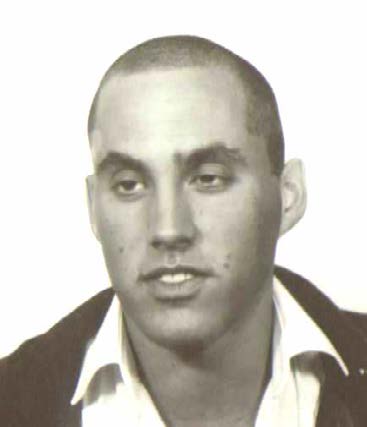

been deployed as a forced labourer in the construction of the Bur-
ma Railway, 2 a war crime claiming the lives of nearly three thou-
sand Dutch soldiers.
Back home, I reflect profoundly on the ultimate consequence
of being sent on a military mission. On the Ministry of Defence’s
website, I read that the armed forces are tasked with defending our
freedom and democracy, as well as advancing the international
rule of law. Justice is not a given, as evidenced by the world war ter-
rors my family had to endure, and which Queen Wilhelmina also
outlined in a personal letter of condolence to Grandpa in 1947.3 The deployment of the Dutch Armed Forces appeals to me. I decide
to apply in order to undertake these duties, whatever the conse-
quences may be.
I fill in an application form, which comes
with several attachments. As requested, I en-
close a passport photograph. I also need to
sign up front to swear allegiance to the Queen,
obey the laws and submit myself to military
discipline. And I have not even been admitted
to the ranks. Still, I sign the allegiance, so help
me God Almighty.4
Passport photo
Meanwhile, I have taken up a new temp job.
On 8 June, I will commence at cable operator
Casema, which offers cable tv, telephone and
internet services. 5 As a telephone helpdesk
assistant in the Telesales department, I speak
with potential customers interested in inter-
net access, and arrange appointments in case
technicians are required to make house calls.
The department is located on the fifth floor
of Casema headquarters on the outskirts of the
historic town of Delft. I work from Monday to
Friday, from six to ten pm. The atmosphere is
pleasant, I get along well with everyone, and
the pay allows me to make ends meet. Evening
Chapter One | Character
15
hours pay overtime, so I receive a 30-hour salary for a 20-hour job.
It’s perfect for me — I can work out all afternoon.
On 11 June, I check in at the Amsterdam Navy Barracks for the
psychological assessment of my suitability as an aspiring marine
officer.6 Ms P. Strijbosch explains to me that only information I provide myself will be used. She also guarantees that it will be
treated confidentially. That sounds fair and square, but during the
interview it becomes clear she herself does not adhere to this no-
tion. She raises a few questions indicating that she has knowledge
of my personal antecedents. This is rather surprising, as I have not
yet given permission to be screened by Military Intelligence. Yet
despite my dismay, I keep quiet about it.
Among other things, Strijbosch asks about my current job. I tell
her I started working as a helpdesk assistant in Casema’s internet
department, much to my delight. It strikes me that the military
psychologist is taking notes most decisively, even jotting down
information on the company. To ease tensions, I jest: ‘Would you
perhaps like to come and work at my place?’ Strijbosch smiles and
goes on taking notes.
In the afternoon, I am called in for the results. A colleague of
Strijbosch, Mr P. van der Pol, accompanies me to a room. He comes
right to the point. He thinks I am unfit to become a marine officer
because — and here is the zinger — my character is supposedly ‘too
strong’. Marine Corps drill instructors would be ‘unable to break
me’. He thinks my character is ‘too well developed’ and my broad
work and life experience is commendable.
Not only does the recruitment psychologist put a remarkably
positive spin on me being rejected, but he also surprises me by
bringing up a private matter. Although I did not disclose my sex-
ual orientation, he tells me that while training Marine Corps of-
ficers, the Navy has had bad experiences with ‘guys like me’. The
psychologist explains that in the Marines, homosexuals are not
considered to be one of the boys. As a result, virtually no gay can-
didates reach the end of the training course. Although Van der Pol
knows one gay man who indeed finished the training course, he
16
The Cover-Up General
felt compelled to leave eventually, having been isolated for a year.
Obviously, homosexuality cannot be used as a reason for re-
jecting recruits. However, that does not remove the problem of
gays not being accepted by the Corps. The psychologist lets on he
is not happy with the selection procedure either. He has raised
objections regularly, but his superiors never budged: ‘Nothing
ever changes.’
But how does the director of Recruitment & Selection view this?
Van der Pol replies that the latter barely knows what is going on.
The psychologist does not think highly of the servicemen working
at the naval barracks. ‘Softies’ they are, posted here because they
are unfit to sail.
Being rejected on the grounds that ‘my character is too strong’,
seems a feeble excuse to me. An elite force refusing recruits
deemed too strong for warrant officers to handle, is, I think, simply
ridiculous. As I tell Van der Pol I will be lodging a formal complaint
on the matter, sure enough he appears to appreciate my decision.
Without my asking, he gives me a piece of advice: the military is
wary of negative publicity — such is to be avoided. Therefore, I
should express myself thoughtfully. Van der Pol points out that I
am intelligent yet modest. I do not impose myself and put group
interests first. These specifics go down well with the Corps.
The next day, I visit my maternal Uncle Frans Erkelens Jr. in his stu-
dio in The Hague. Frans is a celebrated painter. 7 Princess Irene, for instance, is an admirer of his, 8 and Queen Mother Juliana opened
an exhibition of his work in Amsterdam’s Nieuwe Kerk (‘New
Church’) in 1981.9 My uncle would immerse himself in a subject for
a while to create a series of paintings about it. Over the years, he
drew inspiration from varied themes such as the Battle of Arnhem,
the Great Pyramid of Giza and its Sphinx, as well as the Javanese
goddess-queen of the South Sea.
Once I explain I was rejected by the Netherlands Marine Corps
on the grounds of my character being too strong to be broken,
Frans starts laughing. In his opinion, I should be happy with the
assessment. Had I not applied to prove my manhood? If anything,
Chapter One | Character
17
is being considered ‘too strong’ not a generous acknowledgement
in this particular area?
In jest, he adds that the Armed Forces apparently realise that
with my tough appearance they are facing too great a challenge.
In essence, I am thought to be no match for ranking officers. His
reasoning: perhaps I have been discussed secretly, by generals
who reckoned they were not in my league. Much to their dismay,
of course.
My uncle’s absurd appraisal of the situation makes me laugh.
Then again, it does not alleviate my disappointment. I regard it my
calling to follow in my grandfather’s footsteps. According to my
family, I resemble him a lot. Yet, as Frans Erkelens Sr. died before I
was born, I only know of him through stories and photographs. Ac-
tually, I know very little about my grandfather. He was a member
of the Dutch East Indies court martial, 10 and climbed to the rank
of colonel,11 though he never did talk about his job all that much.
When I relate that I want to serve my country like Grandpa,
Frans gets serious again. He tells me that as a conscript he received
preferential treatment — having been employed as a writer in Naval
Intelligence, thanks to the reputation of his dad: my grandfather.
My uncle also points out we are descendants of Toontje Poland,
a hero of the colonial Java War. The Dutch vanquished Islamic
warrior-prince Diponegoro in 1830, after luring him into bogus ne-
gotiations. Poland’s ‘acts of excellent bravery’ were rewarded with
the Military Order of William 12 — the highest military honour the
Kingdom can bestow. During the war, two-hundred thousand Mus-
lims were slaughtered.
Jokingly, Frans advises I convey to the Defence Ministry that I
wish to continue a proud family tradition. ‘Maybe then they will
employ you. Although they might then offer you a completely dif-
ferent job.’
18
The Cover-Up General
CHAPTER TWO |
CHAPTER 2
Defence women
Meanwhile, I enjoy working at Casema’s Telesales depart-
ment. The evening workload is light and the office cul-
ture informal. I have young colleagues and as the work is
fairly simple, there is room to chat with each other in between calls.
Besides my temp agency Randstad Callflex, there is a second
agency that dispatches flex workers in our department. That com-
petitor is called Teleprofs and is cheaper.
On 3 July, our manager Anna at Casema offers me permanent
employment, as this is cheaper for the company than me working
through the temp agency. I appreciate this kind offer, yet I decline,
as my ambitions do not lie with Casema.
Meanwhile, two new women have joined Telesales, both tem-
porary workers from Teleprofs. My colleague Julia knows of my
interest in the Armed Forces and informs me about the peculiar
background of one of them. She looks me straight in the eye as she
tells me that this flex worker’s name is Monica and this woman is
also employed by the Military Intelligence Service. I cannot believe
my ears. Yet Julia surely pronounces the name of this secret service
very precisely.
The background of our new colleague is surprising. Why would
someone from an intelligence agency come and work for us? My as-
tonishment increases when Julia adds that Monica, who is rostered
during daytime hours, is eager to meet me. She would have already
inquired about me.
Teleprofs’ second new temp is a taciturn woman, estimated to
be nearly fifty. She is to work in our department for five weeks,
Monday through Friday from five to ten pm. When I see her at first,
Chapter Two | Defence Women
19
she tries to ignore me. I introduce myself and hold out my hand,
but to my surprise, she refuses to accept it. When I clarify it would
be nice to know her as we work in the same department, the wom-
an looks unpleasantly surprised by this information. With obvious
reluctance, she eventually shakes my hand and mentions only her
first name: Ina.
She looks like the motherly type. Cautiously, I ask her whether
her husband doesn’t mind her not being home in the evenings. To
that she snarls: ‘He thinks of that in a completely different way.’
Later, when chatting with a colleague at work, Ina tells how she
loves gardening and has a huge garden in Egmond aan den Hoef.
Having never heard of her hometown, I ask her where it is. It turns
out to be a village all the way near Alkmaar. Isn’t it a nuisance hav-
ing to commute to Delft every day for just several hours of work?
With a stutter, Ina says she is staying the nights in The Hague for
her job. Where might that be? At her aunt’s, she stammers.
Ina is not very approachable. For instance, she refuses my help
when she is at odds with her computer. Moreover, to create dis-
tance, she stresses to me her seniority. Out of respect for her sen-
iority, I am more than willing to address her as ‘Mrs’, but since she
won’t say her surname, it becomes difficult to address her in a cor-
rect manner. I try a few times saying ‘Mrs Ina’, but I cease doing so
since everyone simply calls her by her first name.
By the way, there is something odd about that first name. When
Ina is addressed by colleagues on the work floor, it strikes me that
she does not always respond. After this has happened a few times,
I ask her if Ina is indeed her real name. She is startled by my ques-
tion. She answers ‘Yes’, while stuttering violently.
Later, my colleague Angela asks me if it is true that I applied for
a job in the Navy. When I confirm this, she tells me that she heard
from Ina that her husband also works there. Both new temps there-
fore turn out to be Defence women, which is remarkable.
Once I have a moment alone with Ina, I ask her what her hus-
band does for a living. After all, I am curious about her mysterious
background. I may have put my question to Ina somewhat out of
the ordinary, by the way. Maybe it is my intuition. Or is it clumsy
20
The Cover-Up General
once I ask her what her husband does ‘at the MoD in The Hague’?
She is shocked by my words. Instead of replying, she asks with
an apprehensive look how I figured out her husband’s profession.
That is a surprising response because it confirms that her husband
works at the Ministry of Defence (MoD) in The Hague, where main-
ly senior staff officers are based. Hereupon I decide to increase the
tension a little by remarking dryly that I have connections.
I have to laugh a little at Ina’s reaction, but soon I notice that she
is shocked more than I had anticipated. I then try to calm her down
by explaining that she herself had revealed her husband’s occupa-
tion to Angela. Still, I fail to calm her down: she is too horrified.
On another evening, Ina is talking to Angela about the opening
phrase she uses on the phone. I hear Ina state vigorously that she
only uses her maiden name at Casema.
Her uptight conduct never ceases to amaze me. I cannot hold
back and ask her why she does not use the name of her military
husband. Ina is startled once more by my directness and declines
to answer. She forbids me from mentioning her husband’s profes-
sion; I am supposed to keep her military relationship a secret.
When we pick up the phone at Telesales, we always mention
Casema’s name first and then our own. When I hear Ina answer the
phone at a certain point, however, she makes a mistake. She seems
to have daydreamed, forgetting for a moment that she is in a busi-
ness environment. She only mentions her name. To my surprise,
she doesn’t say ‘Ina’, nor does she use her maiden name. Instead,
sweetly she introduces herself as ‘Mrs Van Baal’.
She is hugely embarrassed that she has divulged her identity.
‘Oh, how silly of me!’ she says aloud. She then apologises through
her headset to her unsuspecting internet customer. Ina actually ex-
cuses herself so profusely for her slip of the tongue that it almost
seems as if she has committed a true mortal sin by revealing her
real name and thus her husband’s surname.
‘Mrs Van Baal’ does not notice me observing her and laughs for
a moment at her own stupidity. Then she tries to recover. In an
exalted tone of voice, she mentions the name Ina. For the sake of
completeness, she adds that she works at Casema, before finally
Chapter Two | Defence Women
21
listening to her internet customer on the other end of the line.
Her slip of the tongue makes me realise that strange things take
place on this work floor. My intuition tells me I should remem-
ber the name Van Baal well. Although I try to focus on my work,
Ina draws more and more attention to herself with her peculiar
behaviour.
Yet things are about to turn even stranger. When I turn up at
the office on Wednesday 8 July — the day before I was called off due
to overstaffing — supervisor Marlies strikes up a conversation. She
is the informal supervisor of Telesales in Anna’s absence, and she
says she is worried about what happened the previous day.
To make copies in the hallway, she had left her staff badge at her
workplace. However, on returning with the printouts, her badge
was gone.
Marlies is stunned. Hardly able to believe it, she suspects Ina
stole it. After all, Angela and Ina were the only two who had re-
mained in the department. Angela could not have been the one
because she has known her for so long. And so, the suspicion nat-
urally falls on Ina.
A staff pass is issued at Casema only to regular employees.
Temporary workers like Ina and me can therefore only enter or
leave the secure premises when accompanied by a colleague with
a badge.
Marlies says that her stolen card contained a consumption
credit of just pennies for the snack machine in the hallway. How-
ever, she cannot imagine Ina stole her badge simply to relish a free
snack. You wouldn’t expect that from a middle-aged woman, right?
Apart from Ina, I also get to know our new temp Monica. She greets
me warmly when I appear at the department at a quarter to six.
Monica is an attractive blonde woman. She bears a striking re-
semblance to Czech tennis star Martina Navrátilová. Monica wears
dark-brown leather trousers, lending her a butch look. Even though
she had already finished work at five o’clock in the afternoon, she
continued for an hour longer on her own initiative. This in order to
meet me, as she lets me know right away.
22
The Cover-Up General
I do find it amusing that Monica, busily moving her hands while
talking, shows such interest in me. Julia had not been kidding then,
when she mentioned that Monica was eager to meet me. I react
joyfully. Monica’s initiative is in sharp contrast to the way Ina tries
to ignore me.
Monica says she has already heard a lot about me and works at
the ‘M… I… D… ’. ‘She pauses briefly after each letter as if giving up
a riddle. I ask Monica whether she likes working at the Military In-
telligence Service (Dutch: mid), to which she expresses her appre-
ciation for the fact that I know what those three letters stand for.
Immediately, she starts complaining about the workload and
stress at the mid. To my surprise, she is in no way reluctant to criti-
cise her employer openly. Also, she tells me that there is a lot going
on at the mid about an infamous ‘photo roll of Srebrenica’, a sub-
ject about which I only vaguely remember hearing something in
the media.
Monica explains that her boss has given her an entire week’s
leave from her full-time job at the mid, in order to work at Casema
during the daytime. As I then point out that I only work in the eve-
nings, she nods affirmatively and says she has already adjusted her
hours. From next week, she will be in the office from six to ten pm;
that will give us the same working hours.
When I got to meet Ina, I surprised her when I mentioned that
we happened to work in the same department. Monica is equally
surprised. She wants to hear from me why I am not working at the
neighbouring Internet Helpdesk.
Reflecting on this, I think back to the interview at the Amster-
dam Naval Barracks. When I answered that I was a helpdesk assis-
tant — my job title according to Randstad Callflex — this was written
down remarkably accurately. Could this be the reason for the con-
fusion of the two Armed Forces women? Might the professed con-
fidentiality of the psychological interview have been breached? I
find this hard to believe, but do not rule it out.
When I ask Monica why she believes I work at the Internet
Helpdesk, she replies that she finds that more fitting for me. We
met just a few minutes ago — I remark that she certainly assesses
Chapter Two | Defence Women
23
me very quickly. To this, Monica says with a broad smile that she
has had a good impression of me for quite some time.
On another evening, I see Monica again at Casema as she is about
to go home. Again, she complains in her rather loud voice about
the Military Intelligence Service and the photographic film of the
Srebrenica tragedy. This time it strikes me that a colleague who’s
sitting behind Monica is listening in attentively. It’s Ina, the oth-
er Defence woman. Looking past Monica, I see Ina’s jaw drop in
amazement at everything she is saying. Monica doesn’t notice this
and tells me that I really shouldn’t believe that the photo roll failed
to develop. It is just stored in the archives of the mid. She also
says, ‘You can understand yourself why the photos have not been
released.’
I barely know what she is talking about, but find it exciting that
someone from an intelligence agency is informing us of real state
secrets. I tell Monica I don’t know. She then reveals in the presence
of colleagues that the photos are damaging to the military.
Later that evening, Angela asks Ina what again is Monica’s re-
markable profession. Ina appears to have forgotten that, although
she listened open-mouthed when Monica talked about the mid. In
a weak voice, she remarks: ‘Ah yes, what was that again?’
In a quasi-accusatory tone, I shout: ‘She’s a spy!’ It’s just a gag,
but Ina flinches violently. When I then look her straight in the eye,
for a moment it appears she feels like she’s been exposed. This sur-
prises me since I was merely joking about Monica’s ‘infiltration’
into our firm, not Ina’s.
I find it hard to believe. Why would military spies infiltrate an
office department in Holland where subscriptions for cable inter-
net are sold?
The jittery way Ina reacts makes me curious about what she is
up to. At some point, I get the inkling to ‘sneak up’ on Ina. I decide
to do this when I need to hand her a sign-up sheet anyway.
While Ina is sitting at her desk, I first walk to the window behind
her with the form and a cup of tea. Ina turns around suspiciously.
However, when she sees that I am just staring out the window, she
24
The Cover-Up General
is once again put at ease. She continues what she is doing. Half a
minute later, I leave the tea on the windowsill and tiptoe over to
Ina. I breathe softly. Cautiously, I look over her right shoulder.
To my utter amazement, I see Ina taking notes on her Telesales
colleagues. In a lined school notebook, she has written down her
observations after each name. The notes are elaborate: on each col-
league she filled one to several paragraphs. Her rounded handwrit-
ing is easy to read. Moreover, the structure of the notes makes it
easy to comprehend them quickly. Ina uses pens with two colours.
Some words she has underlined with a ruler.
First, my eye catches what she wrote down after my underlined
name: she complains about my impertinent questions. One can
read also that Monica laments about the Srebrenica photo roll.
As Ina flips back a page of her notebook, I stumble upon a writ-
ten confession. Hastily, I read that Ina stole Marlies’ access card
while making copies in the hallway.
I am dumbfounded. What this is all about is beyond me.
I cannot read along for long as Ina suddenly senses that I am
standing behind her. She rocks violently and bounces up from her
chair. Quickly she hides her notebook beneath the other papers on
her desk. I ask her if she has a secret to hide, but she does not an-
swer. Her face turns red.
I still wish to give Ina the registration form, but she’s unwilling
to take it. Even when I add that it is a form from one of her clients,
she refuses to accept it. Ina seems utterly confused. With a sigh, I
put it down on her desk in the hope that she will later realise what
Casema hired her for — to enrol internet customers.
Ina’s confusion gives way to anger. Again, she issues a ban. Be-
sides my being required to keep her military relationship secret,
I am now no longer allowed to walk towards her without her first
seeing me approach her. Apparently, I am to give her space secretly
to describe everyone in her little notebook.
On 13 July, I take a day off. The next evening, I sit together with
Monica and Ina at one joint desk. In between phone calls from cus-
tomers, Monica complains that many things happen at the Military
Chapter Two | Defence Women
25
Intelligence Service that are completely irregular. No one at the mid trusts anyone anymore.
As Monica is grumbling about the mid, she seems unaware that
there is another Defence woman in the group. Actually, she tells
her colleagues that she feels at ease with us. And that it is a relief
for her that she can finally be herself amongst us after her daytime
work at intelligence. For instance, she takes the liberty of calling
her girlfriend and flattering her with sweet words.
She feels so at ease that she proposes to talk about first love ex-
periences. From female colleagues, she likes to know what their
‘first time’ was like. Ina feels uncomfortable with this intimate sub-
ject; her body language indicates that she does not want to expose
herself. For a moment, I consider helping Ina out. However, as Ina
sometimes snarls at me, I don’t interfere.
Despite her obvious reservations, Ina recounts her love story.
In doing so, she soon ends up with her husband, whom she lov-
ingly calls ‘my Ad’ thereby casually disclosing the first name of her
military spouse — something she does not seem to realise. On the
contrary, she breathes a sigh of relief that having recounted meet-
ing Ad, she is done answering Monica’s question.
Monica, who talks enthusiastically about the girlfriends she
used to sneak kisses with in her school’s bike shed, does not ask
about my first intimate experience. Rather, she talks to me about
other topics. One evening, for instance, she tells of two befriend-
ed MoD colleagues who started talking to the press. In the radio
programme Argos, they anonymously criticised the mid’s handling
of the photographic film of the fall of Srebrenica. At the mid, says
Monica to me, there was a lot of buzz today about these embarrass-
ing revelations. According to her, Military Intelligence would not
know how to deal with the truth.
It disappoints Monica that I don’t know Argos. She explains that
this current affairs programme is broadcast by vpro on Radio 1.
In addition, she says that with my background, I should take more
interest in the upheaval over the photo roll. This remark makes me
suspect that she sees in me a sounding board for her secret service
work. I let her know that, like her, I am an advocate of openness.
26
The Cover-Up General
Without my asking, Monica explains why the photo roll is be-
ing withheld. According to her, the reason is rather trivial, but in
the Armed Forces, some would definitely want to prevent the pho-
tos from being published. There is fear of publication in a popular
opinion magazine like Panorama or Nieuwe Revu.
And then Monica tells me she attended a secret MoD meeting
on the photo roll. There, someone had insisted that the Dutch sol-
diers involved in the fall of Srebrenica should be protected from
publication. It was necessary to prevent the boys in the photos
from being recognised by their relatives and friends. It would be
unpleasant for them should the photos be published in the tabloid
press. At the tennis club or at the pub they might be confronted
with their role in the Srebrenica tragedy.
I ask who brought this up, but Monica is not allowed to say. She
only wants to reveal that it concerns a man who was invited to this
intelligence meeting even though he did not belong to the mid.
Monica’s comments regarding the upheaval arouse my curiosity.
Apparently, it has been arranged with the mid that the Dutch gov-
ernment could be deceived about the photo roll.
Later, I follow Monica’s advice and research the fall of Srebren-
ica and the infamous photo roll. Thus, I learn that during the Bos-
nian war, the United Nations (un) had designated the town as an
enclave for Bosnian Muslims, called Bosniaks. Dutchbat, a Dutch
un army battalion, had to protect the enclave. Nevertheless, the
town was captured by Bosnian Serb forces on 11 July 1995. The
Dutch offered hardly any resistance to the advancing Serbs.
After the takeover, the Serbs killed more than eight thousand
Bosniak men and boys. Officers responsible for their protection in
the enclave included the Commander-in-Chief of the Royal Neth-
erlands Army, General Hans Couzy, and his deputy General Ad
van Baal.
I ask the vpro for a copy of the Argos broadcast of Friday 10 July
1998, which deals with the withheld photographic film of lieuten-
ant Ron Rutten. The programme features General Couzy; Van Baal
does not get to speak.
Argos’ editors explain that the photo roll contains pictures of
Chapter Two | Defence Women
27
murdered Bosniak men, pictures that could serve as evidence for
the war crimes committed by Bosnian Serb servicemen in Srebren-
ica. But let Argos speak for itself:
The photos were taken two days after the fall of the enclave by
three Dutch un officers: two lieutenants and one adjutant. They
had gone to investigate near a stream and found nine corpses
there. Lieutenant Eelco Koster was one of the three: ‘I got my-
self to stand among these to demonstrate and say: listen, the un
has been here and we have proof of people being killed here.
And with this evidence, we thus want to show the world what
happened in the enclave in these days.’
The three even risked their lives, Koster told tv programme
Nova last April [April 1997]. Because immediately after they had
taken the photos, they were discovered and shot at by Serbian
soldiers. Still, they did manage to escape to the Dutch base and
bring the roll to safety. Once back in the Netherlands in late
July [1995], the roll was ruined while being developed in a Navy
photo lab.
The cover-up of this photographic film for which Dutch officers
risked their lives, raises questions: how does the misappropriation
of such evidence of war crimes relate to the Armed Forces’ duty to
promote the international rule of law? The roll proves that prior to
the genocide, Dutchbat was aware that the Serbs were killing Bos-
niaks in Srebrenica. Does the Dutch army perhaps prefer not to be
confronted with this reality?
Argos offers an explanation as to why the mid covered up the
photos. The radio programme says it spoke to a senior serviceman
closely involved in the Srebrenica operation. To ensure his ano-
nymity, the interview with him had been re-enacted.
In the recreated interview, the senior serviceman reveals that
there were also other photos on the roll:
Look, there are a lot of stories that have not been told. … [about]
things one shouldn’t have done, that are not in one’s mandate.
28
The Cover-Up General
For example, that one thus helped the Serbs to bring displaced
persons [the Bosniaks] to the bus or out of the compound [the
Dutchbat barracks in the Srebrenica enclave]. Look, you can
say: so at least then I am certain that these people are not beaten
and robbed or whatever. But the reverse is also true, of course,
because you can also say: listen guys, we are not participating
in this. And what those Serbs do, that’s their own responsibility.
On Casema’s work floor, Monica explains that fear of publication
is actually the only reason why the photos are being withheld. Ac-
cording to her, other issues would not play a role.
Monica sighs that she wants to leave the mid because it makes
her ‘totally crazy’. For the first time in all her years working at the
mid, she took this side job. Although civil servants are not allowed
to have a second job, Monica says she and her girlfriend can make
good use of the extra income. After all, she has no savings because
she spends a lot on parties and buying leather trousers.
She also tells of her own accord how she ended up at Casema.
She seems to be trying to convince her new colleagues that she
joined us in a normal way, as if it were not unusual for someone in
the intelligence sector openly to hold a second job.
Monica reveals that she was shopping in the street Noordeinde
in the city centre of The Hague. To her surprise, she saw a vacancy
announced at the employment agency Teleprofs already outside.
She decided to apply immediately. Perhaps Monica had taken
her cv with her when she went shopping that day, because she was
able to join us right away.
Apparently, this Teleprofs branch in The Hague believes it is
tasked with giving jobs in Dutch businesses to intelligence officers.
During MoD working hours, mind you. Defence woman Ina, who
lives in the North Holland countryside, is employed through the
same agency. The travel distance between her home in Egmond
aan den Hoef and Delft is almost 100 kilometres (60 miles) while
Teleprofs does not reimburse travel expenses. It doesn’t seem to
bother Ina. On the contrary, I see her beaming when she remarks
that, just like Monica, she has also managed to start working for us.
Chapter Two | Defence Women
29






Alkmaar
• Egmond aan den Hoef
North Sea
Amsterdam
Ina of Egmond aan den Hoef reports to
Teleprofs in The Hague and gets a part-time
job at Casema in Delft 100 kilometres from
home. For her job, she stays in The Hague.
MID
•
Monica works full-time
Teleprofs • The Hague
for the MID in The Hague and
gets time off to work as well for
Teleprofs at Casema in Delft.
• Casema
Delft
Map of deployments
The pride with which the two Defence women talk about their
‘deployment’ to Delft tickles my funny bone. But when I welcome
my new colleagues enthusiastically, this is not appreciated. My
joke that there is certainly room for more ‘spies’ at Telesales is not
understood. Monica and Ina are thrilled by their missions and I
should not ridicule them. Their deployment is a serious matter.
30
The Cover-Up General
CHAPTER THREE |
CHAPTER 3
Recruitment
Encouraged by Monica’s candour, at Telesales I start talking
about my Navy application. Monica responds immediately
— she invites me to talk about it further in the pantry of our
office floor during our break.
Face to face, Monica talks endlessly about her job at the MoD.
The break runs late and she asks me to bring my application papers
the following day.
That next evening, we again take a break at eight o’clock. When
Monica and I get up to go to the pantry, I invite Ina to join us and
drink coffee together. She declines the offer, however, preferring to
stay at her desk.
During the two interviews, Monica explains that she has worked
in the Military Intelligence Service for more than seven years. She
holds an important position and her immediate superior is a Ma-
rine Corps Colonel. To clarify that this is a high rank, she needless-
ly explains that this position in the military hierarchy is directly
below that of general. She does have a new boss now, but basically
still works for her colonel. She has been close friends with him for
years, unlike her new boss with whom she does not get along.
Next, Monica indicates that her intelligence service needs en-
thusiastic people like me to balance out her ‘flawed’ colleagues.
According to her, my sparkling personality would have a positive
effect on the atmosphere at the mid. To emphasise her arguments,
Monica refers to our brief conversations about the Srebrenica pho-
to roll. Hadn’t I told her to be an advocate of openness? Well then!
As far as she is concerned, I have the right mindset to join the mid.
I cannot suppress a smile as I have to get used to her praise.
However, my talkative colleague does not leave any room for my
Chapter Three | Recruitment
31
doubts. Monica believes in me, that’s clear. When she inquires
about my work experience, I barely have time to talk about my ca-
reer before she interrupts me. Without having told her much, she
concludes that — like her — I am way too advanced for the simple
work at Casema. She points to my broad work and life experience.
I have to laugh at her flattering words. When I applied for ma-
rine officer, this was also pointed out. Where at the time it was an
excuse for rejection, now it suddenly makes me fit for an intelli-
gence job. All a bit confusing.
Monica is unstoppable. She praises my analytical and writing
skills, as well as my command of English (as a Dutch speaker). Add
to that my interest in international politics and diplomacy, and you
have an assortment of qualities which the mid can put to good use.
According to Monica, I am ideally suited to produce intelligence
reports for the deployment of military personnel.
She cites the peacekeeping operations in the former Yugoslavia
as an example. For such operations, Personnel of the Armed Forc-
es who are to be deployed have to be informed about the situation
they will encounter before their departure. Mapping conflict par-
ties, describing the local security situation: Monica is convinced I
would be good at such tasks.
Monica cannot stop talking about the need for information on
the warring factions, only to complain about the atmosphere at the
mid, which has been ruined by intrigue. Almost everyone is leav-
ing the mid; numerous vacancies cannot be filled. So, analysts are
in high demand, a position for which she considers me suitable.
Monica keeps talking and before I know it, she urges me to write
a cover letter to the mid. The request overwhelms me. How do I go
about this? Can I use her name in the letter? Yes, I can. Monica —
articulating her full name carefully — instructs me to write that,
as an employee of the mid during her temp job in the corporate
sector, she pointed out to me the many vacancies at the mid. The
letter must be addressed to the MoD in The Hague.
Monica promises me that she will arrange with her colonel for
me to work as an analyst at the mid. It pleases her that I have no
holiday plans or other commitments this summer. She expresses
32
The Cover-Up General
the hope of welcoming me as an mid colleague in the near future.
In the letter, I need to beef up my work experience and skills
considerably. Above all, don’t be so humble, Monica adds in her
loud voice. Hence, she instructs me to mention that I have writ-
ten theses on every conceivable topic I happen to be interested in.
The mid doesn’t check everything after all. When she came to work
there, she didn’t know that; but over the years she has experienced
it to be so.
I am surprised that Monica has no problem with the truth being
violated. Whether the chances of exposure are high or not does not
matter. It troubles me that Monica thinks so lightly about falsifying
facts, as if this were normal in intelligence circles.
Monica fails in recruiting me for her secret service because I
have no desire to work in a toxic place. The trap of mistrust and
deceit that Monica keeps bringing up when she talks about the mid
does not attract me at all. Besides, I have other ambitions than sit-
ting in an office making analyses all day. I am not a nerd. I feel good
about myself and I am more attracted to physical occupations: I am
up for a physical, military challenge.
When I tell Monica I was rejected by the Navy because my char-
acter was deemed too strong to be broken by the drill sergeants,
she responds with immediate disdain. ‘Ridiculous!’ she exclaims.
She is convinced there are other reasons behind it.
For a moment, I consider informing her about the gay discrimi-
nation in the Marine Corps. But I don’t feel compelled to lament in
the company pantry that the military presumes I am gay. Although
the tough vibe of a position in the Corps appeals to me, my sexual
orientation plays no role in this career ambition. Putting my love
life on the table? Such a private matter should be far from a topic of
conversation of this kind.
Monica asks if I have ever been ‘naughty’. I don’t quite under-
stand what she means by that, but she wants to know if I’ve been in
prison or addicted to heroin, for example. ‘No,’ is the answer. I have
never been in trouble with the police or judiciary. I don’t smoke,
rarely drink and don’t use drugs. Unlike Monica, who lights up cig-
arette after cigarette, I don’t have anything to do with addictions.
Chapter Three | Recruitment
33
However, an incident from years ago does come to mind. Police
detectives then asked questions about a crime I had nothing to do
with. Just as I am talking about it, a colleague from the Internet
Helpdesk walks into the pantry to get something. His expression
shows his surprise at our topic of conversation and makes one
realise that it is inappropriate in business to inquire about such
matters. Promptly, Monica suggests that she herself carry out a
background check on me.
I consent to that. At the interview at the naval barracks, I was
already surprised by suggestive questions indicating that the in-
telligence community had passed on information about me to the
selection-psychologists. That violates the Wet Veiligheidsonderzoeken
(‘Security Investigations Act’) and the professional code for psycholo-
gists. I hope the Military Intelligence Service can now clarify this.
‘Can you accurately write down your official name, first names,
date and place of birth?’ Monica says she needs the exact per-
sonal details to check my antecedents — so I must not make a
spelling mistake.
The MoD asked for precisely the same data before. I had to fill
them in on an appendix to the application form because they were
needed for an ‘unspecified official administrative purpose’ as the
Navy cryptically called it. And, I also needed to have that attach-
ment checked at City Hall — for ‘legalisation’.
I now understand what the exact personal details were needed
for: the security screening, which, by the way, was not allowed by
law just yet.
First, the vetting process had to be completed. Then I had to
give written approval to the Head of the mid, General Jo Vande-
weijer, before the secret service was allowed to screen me. For that
matter, the Royal Navy would not be given access to the anteced-
ents. Upon completion of the security screening, the mid would
only pass on whether the ‘Statement of No Objection’ had been is-
sued, Navy spokesman Hamaken explained a few months earlier.
Suddenly, we are disturbed. It is Wednesday evening, July 15 — the
digital clock on the kitchen counter reads 8.08 pm — when I hear
34
The Cover-Up General
a clang. The pantry door is rudely slammed shut. A few seconds
later, we are startled again. Bright flashes of light reflect on the
windows.
I straighten my back and look around to find out who is photo-
graphing us. To my left is a large window. Are the flashbulbs per-
haps coming from outside? This seems odd as the flashes are bright
and we are not at street level, but on the fifth floor. On the right is
the slammed door to the corridor, with a small window next to it. I
do not, however, see a photographer.
Amazed, I remark: ‘It looks like we are being photographed.’
But Monica is so absorbed in her recruitment task that she man-
ages not to be distracted. At the dining table, I write the requested
personal details on a copy of a letter I wrote to the MoD inquiring
what is the matter with my naval job application. 13 While reading it aloud, Monica’s mind seems to wander as soon as I utter the name
of my grandfather, whom I want to emulate. I ask her if she per-
haps knows my uncle. After all, he bears the same name and enjoys
some fame in The Hague as a painter.
Monica does not respond to this and takes the letter. She prom-
ises to collect my personal file from the mid next week.
She thinks I should not be so naive and adapt to what is custom-
ary within the military. That my application to the Marine Corps
turned out so odd, wouldn’t say much about marines. Then she
talks about her boss at the mid. Her Marine colonel — whose name
she is not allowed to mention — has been in constant conflict with
mid top brass in the past. He is one of the few who has the guts
repeatedly to criticise the leadership.
Monica goes on to say that her Marine colonel knows about my
application to the Corps. My jaw drops when she tells me that the
man is doing his best for me to join the Armed Forces.
It is strange that Monica has been given a week off to work in
our department. The thought that she has been sent out to recruit
me for an intelligence job is bizarre. That’s quite a cumbersome
recruitment method! Other employers who want to offer you a job
will send you a letter. Or they call.
Despite my reservations, I refrain from commenting to Monica.
Chapter Three | Recruitment
35
I have insufficient understanding of the spy profession and am flat-
tered by the attention she gives me. And that a colonel of the Ma-
rines is committed to me, I am eager to believe.
36
The Cover-Up General
CHAPTER FOUR |
CHAPTER 4
Intrusion
After our conversation, Monica and I return to the depart-
ment. Ina has isolated herself and is the sole person sit-
ting at a separate desk island. Around half past nine in the
evening, Ina excuses herself as she needs to make a private phone
call. This is unnecessary since other colleagues habitually make
brief calls home. However, I have not heard Ina make a personal
call before; curiously, I listen in.
Although she conducts her conversation in a loud voice, she has
to repeat some sentences. Does she have a bad mobile connection?
Nervously, she reports that everything is going well and then an-
nounces in a cracked voice that the video-recorder can be started.
Which tv programme she absolutely does not want to miss, she
does not say.
Once finished, she takes off her headset. She stands up and ex-
cuses herself a second time, as she needs to go to the toilet. This is
rather ludicrous, considering no one bothers with such unneces-
sary courtesies. Monica responds laconically: ‘Yes, if you have to
then you have to.’
Ina leaves three colleagues in the department. Monica and An-
gela sit opposite me facing the corridor. And then: light flashes
again. Amazed, Angela notes that an unknown man is photograph-
ing us from the hallway. I turn my office swivel chair around but
see an empty corridor. He appears to have already disappeared.
Monica, who, like Angela, did see him, is terribly shocked. She
turns white and trembles visibly when I ask her if she knows who
the man is. ‘No, I don’t know,’ Monica says, stuttering.
The next moment, Ina returns. In an extremely tense and
wooden manner, she walks to her desk. Asked by Angela about
Chapter Four | Intrusion
37

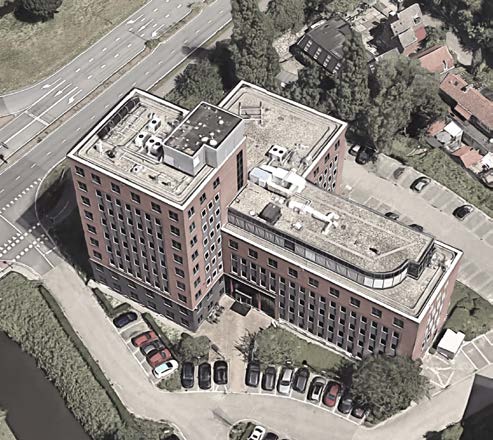
the photographer she denies with the utmost vigour that she saw
anything at all. For that, Ina says she was at the lavatory for quite a
while. Next, she lashes out at Angela. She snarls that she does not
accept ‘being harassed with such impertinent questions.’ Angela is
shaken by these words and humbly apologises.
Meanwhile, worried colleagues from the Internet Helpdesk
come rushing into our department: do we perhaps know who the
photographer is? None of us claims to know him.
Suddenly Monica wanders off. I consider going after her to calm
her down. However, I cannot leave — through my headset I am talk-
ing to a client. This woman doesn’t like the fact that I just asked a
colleague a question and demands my attention.
When Monica returns after a few minutes, she has tears in her
eyes. She tidies up her things and leaves early without addressing
anyone. She remains absent for the rest of the week.
The next evening, Nathan, an Internet
Helpdesk colleague, tells us that the
photo incident has been reported to the
Delft police. He believes we are dealing
with a case of corporate espionage.
The stranger, Nathan reveals, en-
tered the headquarters without setting
Casema office
off the alarm. He then walked past
Telesales and across the floor of the In-
ternet Helpdesk with an impressively
large camera. Here, he dazzled helpdesk
colleagues with his flashes.
A colleague of Nathan’s had the pres-
ence of mind to go after the photogra-
pher and get into the elevator with him.
He had also asked the stranger what he
was doing. The intruder sufficed with a
short answer: ‘This just had to be done.’
Nathan says the photographer once
again managed to bypass the alarm on
38
The Cover-Up General
leaving the premises. He therefore wonders how the man got a
staff pass.
An accomplice waited for him in a car outside. The Casema
colleague pursuing the photographer read the registration num-
ber before the car sped away. Finally, colleagues from the Internet
Helpdesk saw the getaway car from the fifth floor turn onto the A13
highway, in the direction of The Hague.
The police had already tried to trace the Dutch car registration
number, but it does not appear to be registered anywhere. We all
find this strange. Apparently, we are not dealing with ordinary bur-
glars here.
Nathan has no idea what the photographing spy was looking
for on our office floor. After all, there are no confidential company
documents on the fifth floor. Also, he wants to know who the wom-
an is that he saw coming from the toilet. He did not yet know Ina
and found her attitude suspicious when he spoke to her, especially
as she was signalling to the photographer the second she left the
toilet. Nathan therefore suspects her of involvement in the indus-
trial espionage.
Lisa, the boss of our manager Anna, also wants to speak to me.
She takes the time to talk to all employees who were present during
the incident. Lisa confirms that the police have been called in be-
cause of the espionage. The Casema management is worried.
Face to face, Lisa explains that the intruder wanted to photo-
graph Monica. She finds it incredibly strange that this mid officer
has started working with us and that she talks openly about her
intelligence work. But she doesn’t trust Ina either.
Lisa heard from a colleague that I applied to the Marine Corps.
I tell her I was turned down as my character was said to be too
strong to be broken. She doesn’t understand that, to which I reply
that I don’t understand it either and that I spoke to Monica about it
during the break. She works at the Ministry of Defence (MoD), after
all. Lisa nods understandingly and sighs as she searches in vain for
clues to explain the break-in.
Later, another colleague also starts a conversation with me.
Mark, a thoughtful Surinamese, is new to Telesales. He says he is
Chapter Four | Intrusion
39
worried. He was not scheduled on the evening of the intrusion and
asks what happened. I relate, but also ask him some questions.
Walking to the tram stop with Julia after work, I ask her opinion
regarding Monica’s moaning about the photo roll. Although Julia
was the first to divulge Monica’s double life, she now no longer
dares to talk about it. She says it is a dangerous subject.
By now, the events are starting to worry me too: simply because it
is so bizarre that Monica has been sent to us, I have joked at times
about spies. But those were harmless gags. Real espionage is a sub-
ject far beyond my normal experience.
I do not realise exactly all that I have witnessed. Take the note-
book that Ina was writing in. Although I cursorily read in it how she
stole a badge, this memory has since faded. All the bizarre events
are piling up too fast for comfort.
When Ina noticed me standing behind her, she hurriedly put
away her notebook and turned red. While I realise she felt she had
been caught, I don’t attach too much importance to it. She can bare-
ly use a computer; she struggles to find her feet in the department.
Therefore, it seems endearing to me that she secretly keeps a kind
of diary in which she writes down her experiences in her new job.
It has not yet dawned on me that with my glance at Ina’s note-
book, not only is a Defence woman revealing her true role, she
is exposing potentially the Defence organisation itself. Although
Monica complains that the MoD is resisting openness about Sre-
brenica, it does not enter my mind to suspect Ina of playing a role
in this. When you think of a spy, you think of James Bond and not a
mummy who is fond of gardening. Should I have accused her of in-
filtration and military observation? And that in the Telesales depart-
ment of Casema? Who comes up with something that ridiculous?
Even more than the espionage break-in, my application pro-
cess is occupying my thoughts. First, I am turned down because
my character is allegedly unbreakable, then I am offered a job in a
secret service, and now my antecedents are being exposed as there
might be something wrong with them. It feels ominous.
40
The Cover-Up General
CHAPTER FIVE |
CHAPTER 5
Warnings
On Friday evening, 17 July, I strike up a conversation with
Ina when I am briefly alone with her in the department. I
tell her I suspect the Navy rejected me because of a gay af-
fair. Quite to my surprise, Ina responds with empathy. Lovingly, she
talks about her relationship: she confirms that she knows from her
husband that homosexuality is indeed a very sensitive subject there.
But then she is startled. Apparently, she realises she has again
disclosed that her husband works in the military. She clams up
again. Still, I tell her that I have talked to Monica a lot about the
mid and that she is going to look into my personal dossier.
Ina starts trembling. While I previously encountered a sore
point when I linked her husband to the MoD in The Hague, this
time she gets rather tense as soon as her husband surfaces in a
conversation about the mid.
I feel pity when I see Ina, who could have been my mother given
her age, trembling with fear. ‘There will be trouble over this,’ she
stammers, referring to Monica’s plan to check my antecedents. I
decide to leave the subject that is driving her to despair, and con-
centrate further on work.
Monday, 20 July, I am called off by Casema and drop by Uncle
Frans’ painting studio. Last week I was surprised that Monica did
not answer the question whether she knows him. So, I ask him if
her name rings a bell.
My uncle does not have to think long. He remembers Moni-
ca vividly. He had been incredibly annoyed with her. Bluntly, he
calls her a ‘brutal dyke!’ In his anger, he adds that she comes from
Scheveningen and is a vulgar woman with no manners.
Chapter Five | Warnings
41

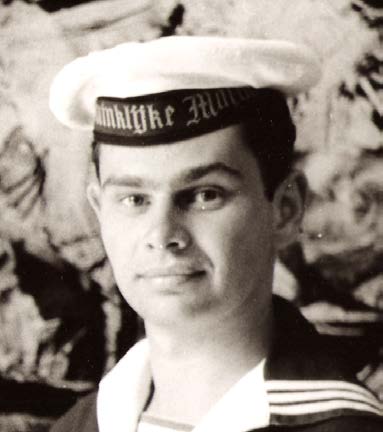
A few years ago, she had taken some painting lessons in his
studio. She had no talent and no interest in painting either. In-
stead, Monica kept bothering him during group classes with prob-
ing questions. She wanted to know all about his contacts with the
Egyptian embassy.
Frans spent many years immersing himself in Jewish mysticism.
He also became interested in the culture that had shaped this an-
cient people and he created a series of oil paintings inspired by the
Great Pyramid and the Sphinx. Exhibitions and trips to the Land of
the Nile resulted as a matter of course in him befriending several
Egyptians, including the Minister of Transport and Tourism. 14
I tell my uncle that Monica has been working in the Military
Intelligence Service for more than seven years. He is relieved as
it confirms the suspicion she aroused in him when she was taking
lessons from him. He was dead right after all: Monica is a spy.
I also tell him about the other Defence
woman at Casema; however, he has, unfortu-
nately, never heard of Ina. About military in-
telligence and how they operate there, he can
speak volumes, though. During his time of ser-
vice in the Naval Intelligence Service (marid),
he frequently encountered vice cases. Usually,
it involved forbidden sexual contact between
Frans in the Navy
servicemen, issues that were then quite often
covered up. A name was then quickly changed
in the dossier.
Uncle Frans explicitly warns against the
dirty games played in military intelligence.
Instead, he prefers to talk about the paintings
he made during his service. For instance, one
day he had painted a portrait of Jan van Dulm,
then Head of the marid. 15 The painting was
received with praise, after which Frans was
allowed to paint the most senior officers.16 It
did not stop there. The admirals also had their
wives come by for a faithful portrait.
42
The Cover-Up General
Once home, I realise that while Monica is looking into my ante-
cedents today, I have also found out more about her. At least now
one can understand why she refused to respond to the question
whether she knows my uncle. Her earlier misbehaviour at Uncle
Frans’ studio she prefers to keep to herself.
With the new information, I can better place Monica’s intelli-
gence work. Her painting lessons in order to explore his diplomat-
ic contacts, and her work at Casema to recruit me for the position
of military analyst, point in the same direction. The penny drops:
Monica fulfils intelligence assignments by the score.
On Tuesday 21 July, I am once again called off by Casema. Telesales
has been facing overstaffing since two Defence women started
working who have a preference for my working hours.
Wednesday evening, I arrive back in Delft, where Anna informs me
that she has terminated the contract with my temp agency. This is
surprising as Randstad did not communicate anything about this.
Anna also does not explain further why she dissolved the contract.
She does however suggest I work another two hours, because
otherwise I would have cycled from The Hague to Delft for nothing.
I accept the offer and walk over to supervisor Marlies. The events
do not leave her unmoved — with tears in her eyes, she tells me the
departure has nothing to do with me. On the contrary, Casema is
very pleased with me. She has no idea why I have to leave and says
she is overwhelmed by it.
I grab a chair at Ina and Monica’s desk island. Ina, however, pro-
tests vehemently. She shouts that I have been fired. She forbids me
to sit down because I would no longer have anything to do in the
department.
Ina’s mention of ‘firing’ startles me. This is not a question of
getting fired, nor has Casema used this word. Ina’s audacity upsets
me; she only has a summer job and should not interfere with my
every move. I sit down opposite her.
One can only guess at the reason for my departure and I suspect
it has to do with Ina’s intrigues. Could it be her revenge for last
Chapter Five | Warnings
43
Friday when she was terrified while talking about her husband and
the mid?
I no longer care about being prohibited from mentioning the
profession of Ina’s husband. I bluntly state that three of us have
something to do with the Armed Forces: isn’t it a coincidence that
Monica works in Defence, Ina’s husband too, while I applied there?
Monica jumps up fiercely. She turns her head to Ina, who is sit-
ting next to her, and looks at her with a wary eye. So, apparently,
Monica did not know that besides her, another Defence woman
was deployed with us.
The revelation causes Ina to erupt in anger. She snarls about the
concurrence: ‘It’s not at all coincidental!’ She refrains from further
explanation.
When I ask Monica between a few phone calls about the intelli-
gence file relating to my Navy application, she says aloud that she
cannot say anything about it. Well, apparently she can after all. Be-
cause moments later, she whispers that she wants to speak to me in
private afterwards, in the hallway in front of the lifts.
44
The Cover-Up General
CHAPTER SIX |
CHAPTER 6
Antecedents
At eight o’clock in the evening, I clear out my desk drawer.
Anna stays with me and tells me she is dissatisfied with my
temp agency. One temp from Randstad Callflex reported
sick on the first day; the others are on holiday. Anna explains that
of the four Randstad temps, I am the only one doing his job. As a re-
sult, it was decided to continue using only the services of Teleprofs.
I say goodbye to Anna and my colleagues in a perfectly friendly
and civil way. Only Ina demurs: she refuses to wish me well and
indeed faces me with a hostile look.
I leave the department and walk to the hallway in front of the
lifts. I wait there for Monica, who explains that she is not actually
allowed to say anything about my personal file. On her own ini-
tiative, however, she does shed some light. My antecedents were
indeed the stumbling block. Although, according to the law, my
past should not have been raised at all, she nonetheless says that a
‘clean record’ is required when applying for such a job.
I am perplexed. First my character is too strong and now sud-
denly I am confronted with the opposite: my character or integri-
ty would seem to be too feeble to serve my country as an officer.
Nonetheless, I am of use to the state government as an analyst at
the mid, a highly sensitive position in which I would undoubted-
ly come into contact with state secrets. How is it possible that the
Armed Forces should approach me in such a contradictory man-
ner? And does it demonstrate integrity that the MoD examined my
past in violation of the Dutch Security Investigations Act?
Monica’s emphasis on my antecedents forces me to think back
to phases in my life that I thought I had left behind. I am not with-
out faults and have committed indiscretions at times.
Chapter Six | Antecedents
45
For example, when I worked as an escort for a while in the past,
I agreed to take part in a very controversial project of the bvd, the
Domestic Security Service of the Netherlands. It involved giving
sexual pleasure to high-ranking foreign guests.
One of the project’s organisers approached me for this in the
summer of 1992. The man, who was a friend of mine, told of the
reluctance to use the existing escort agencies in The Hague for the
diplomats. Instead, the bvd wanted to contract its own girls and
boys of a higher level. For this, I was approached. Explicitly, the
organiser pointed out that there was not only a need for call girls,
but also a sole call boy. Diplomats with gay or bisexual preferences
could thus also be accommodated.
I declared my willingness to work as an escort for the bvd. Nev-
ertheless, it did not amount to anything and I stuck to my own cli-
entele. This is because, on second thoughts, the bvd only wanted to
make use of a few students at the Hotelschool in The Hague. Since
they lived on campus, good supervision was possible. The bvd’s
long arm could easily intervene in case the girls and boys were
found to be indiscreet. After all, the escorts were not supposed to
cause trouble.
But there were other reasons for engaging with students from
the Hotelschool. For instance, it was seen as practical that the
school is located in the ‘Royal city’, as diplomats also tend to stay
here. Moreover, the central government valued the education. For
the pleasing of the distinguished guests, it was helpful that the stu-
dents here learn their foreign languages, dress representatively
and are trained to be service-minded.
Regardless of whether they would seclude themselves with a
diplomat that evening, the young government escorts would re-
ceive a fixed amount of five hundred guilders, each evening they
were to indulge the diplomats [about 1,200 euro in today’s money].
Moreover, they were required to tie up part of their earnings for a
long period of time. The organiser told me that they were allowed
to get their savings only if they kept quiet about the nature of their
work. In the contracts he drew up for them, the overt term ‘escort’
was not used. The state government spoke of ‘hostesses’ and ‘hosts’.
46
The Cover-Up General
Absolute discretion was required because Dutch citizens and
Christian politicians would have great objections to spending
public money on the hostesses and hosts, the man assured me.
Parliament would surely disapprove and therefore it had to be
hushed up.
As a young adult at the time, I did not give enough consideration
to how controversial these sexual services actually were. Because I
did not mean any harm, I hardly thought about it.
I have always done my escort work with a clear conscience.
That I would not have a clean past is therefore beyond compre-
hension. I was approached by the bvd, within the purview of the
Home Office, precisely because of my good name. And even if it
didn’t work out then, how can the State now blame me for my es-
cort past, when they had wanted to hire me for these very services
at the time?
Earlier I sympathised with Monica when she complained about
the mid, but this time the roles are reversed. I am disappointed by
the erratic course of my Navy application and she is visibly com-
passionate. In fact, she is trembling all over. However, since this
level of pity is a bit excessive, I consider that it is mainly the es-
pionage developments in our department that are upsetting her.
While my departure from Casema is sealed, Monica gathers cour-
age. She informs me that her Marine colonel is still committed to
me. In a voice that reflects much tension, she says the last word on
my application has not been spoken.
A few days earlier, I received a written response from Recruit-
ment & Selection to my letter of 21 June. To my surprise, in it, E.M.
Beezemer informs me that I was rejected for the position of aspir-
ing officer partly because of alleged drug use. 17
When I ask Monica if she can explain, no answer is given. I have
had enough by now — I cannot stand this madness — and I bid her
farewell to leave for good this firm with howling and shivering De-
fence women.
As I do not have a staff pass, I ask Anna to accompany me
to the exit. Surprised that I did not leave earlier, she asks what I
have been doing for the past few minutes. When I answer her that
Chapter Six | Antecedents
47
Monica wanted to speak to me in private about my personal dos-
sier belonging to the mid, Anna says she finds this very strange.
And as the lift slides down towards the exit, I realise she is right.
Although my in-depth conversations with the recruiter took place
during breaks, I got carried away with something that had nothing
to do with Casema. Indeed, it is rather unusual for a military secret
service to hold consultations in a civilian company.
The next day, I drop by Randstad Callflex. Consultant Sander ex-
plains that Anna only left a short message on his answering ma-
chine, in which she terminated the contract without informing
him of the reason.
Sander is angry and assumes Anna cancelled the contract for
financial reasons. Randstad Callflex pays an evening allowance in
accordance with union standards. Teleprofs does not do so, which
in his view constitutes unfair competition.
The consultant has discussed the issue with Randstad’s head of-
fice and reports that no more Randstad branches will work with
Casema. Due to unfair competition, Randstad could take Casema
to court. He is also convinced he would win this case, but because
it is a lot of hassle, he leaves things as they are. In addition, he
maintains that Casema should never have dropped us.
A week later, I get an unexpected phone call from a former col-
league with whom I worked one evening in the Telesales depart-
ment. Jasper, 21, is sorry that I suddenly left. He had no idea why
that had to happen and requested my phone number from Anna.
We have many telephone conversations in which he often talks
about Monica because he frequently chats with her at work. The
two talk about topics such as the Gay Games in Amsterdam, severe
gay discrimination at the MoD, and her visiting house parties. Jas-
per mentions that she is from Scheveningen, which I had already
heard from my uncle.
I ask Jasper if he would like to talk to her for me. That same
evening, she calls me on her break, to point out sternly that I should
not contact her. However, she does want to say that my application
48
The Cover-Up General


is back on the agenda at the mid on 13 August. She promises to call
me back about the outcome.
Jasper and I decide to meet. When he settles on the sofa next to
me in my condo, he says he thinks I’m a stud. He had even specially
changed his schedule at Casema in the hope of working there with
me again.
When I met him in Delft, it was mainly his confident gaze that
attracted me. But he also has a nice body. I can’t help but blush
when Jasper touches me. Yet I don’t hesitate for long. We kiss each
other passionately, after which I lift him up and take him to my
bed.
Jasper and I complement each other well. We see each other
more and more often. Almost every weekend he sleeps in my arms,
using my shoulder as a pillow.
I take him to the painting studio of
my uncle, who is very courteous to him.
Frans even invites us to pose together.
Hereupon, we get immortalised as a
love couple on large oil paintings.
While I have a new temp job, Jas-
per continues to work at Casema. Since
he likes to get things off his chest af-
ter work, he keeps me informed about
Monica’s rants about her intelligence
work.
At Telesales, the abbreviation mid
is by now fully established. Monica
Immortalized on canvas
keeps talking about the internal power
struggle there. Finally, she tells her col-
leagues that her colonel — who always
criticises mid policy — is dismissed by
its head, General Vandeweijer. The Gen-
eral and the Marine Colonel couldn’t get
along anymore.
The dismissal affects her. As stress
mounts at the Intelligence Department
Chapter Six | Antecedents
49
of the mid where she works, she sobs more and more in front of
her Casema colleagues.
For her secret service work, she says she has to commute daily
in The Hague between the Frederikkazerne (‘Frederick barracks’)
and the MoD on the Plein, the town square in the old centre.
She goes on to tell Jasper that she once flew to a certain metrop-
olis in the Far East for her job. She just needed to drop something
off in person. But alas, she did not get the opportunity to tour this
city as she had to fly back the very next day. No, things are not go-
ing her way.
Monica cannot stop talking about the Srebrenica photo roll. She
says she has long since seen with her own eyes the prints from the
infamous roll, which supposedly failed during development. She
also confirms to Jasper that the MoD wants to prevent the photos
from ending up in popular magazines.
I also hear from Jasper that now that her colonel is departing
the Armed Forces, she also wants to step down. At Casema, she
says she learned to deal with normal people again and ideally
would like to enter permanent employment there. Spontaneously,
Jasper advises her to write a cover letter to his stepfather, who is
Head of Human Resources at the company. This scares her. She is
angry that Jasper did not inform her about this family connection
earlier and decides to apply for a job with another employer.
It is 4 September when Jasper calls me early in the morning. He
wants to speak to me about an issue that worries him. The previous
evening, Monica ordered him not to see me any longer. She told
him that as a result of my job application, she would have found out
deadly serious things about me. These would even be so severe that
I would not dare to discuss them with him.
When I hear that the Armed Forces are banning my boyfriend
from seeing me, I am shocked. Over the phone, I then make a few
stern statements that slightly surprise myself. I argue that the mid
should be concerned with state security and not the sexual activi-
ties of citizens. I presume to call in The Hague’s top lawyer Gerard
Spong, whom I know from a café I frequent, and hear myself say: ‘I
don’t care if the head of the Head mid has to roll!’
50
The Cover-Up General
It is quite something when a secret agent, behind your back,
orders your boyfriend to break up with you, referring to a secret
personal dossier. A government agency tasked with providing se-
curity information to the Minister of Defence instils fear in Jasper,
with an imputation I cannot defend myself against.
It was Anna, the manager of the Telesales department, who had
Jasper hook up with me by giving him my phone number. Instead
of respecting this, Monica forbids him from seeing me. I realise
that, as a temp, she is seriously overstepping her boundaries in do-
ing this and abusing her position as an intelligence officer. To what
do I owe her suddenly turning on me? It is a mystery. She promised
to call back after the mid meeting but did not. And she also forbade
me from contacting her.
I realise I am dealing with government allegations which are
completely out of bounds. I have the strong impression that the
mid is using my escort past against me, even though it was the rival
intelligence agency — domestic security service bvd — that ordered
everyone to keep quiet on the subject.
That the escort project was made a ‘state secret’ had nothing
to do with national security. No, it was to avoid disgracing the
bvd. There was fear of the public outcry should it became known
that the central government was spending tax money on luxury
hookers.
That same bvd would not give me access to my own personal
file. On 2 July 1994, I had written to request permission to see it,18
but after waiting for more than a year, this was rejected by the Act-
ing Head of the bvd due to state security reasons.19 As a result, my file could not be checked for any errors. I was thus being judged
for entries in my dossier that may have been entered incorrectly
or incompletely.
But what stings most is that my courage to speak the truth is
being doubted. Behind my back, it is casually proclaimed in the
business world that I do not dare to discuss my antecedents in my
intelligence dossier, even though the contents are a mystery. What
on earth can there be in those cursed documents that is so grave
that I dare not talk about it?
Chapter Six | Antecedents
51
It is too ridiculous for words if lovers in this country were to
be required by the State to confess ‘the sins of youth’ to each oth-
er. Challenged by Monica, however, I decide to do this anyway. I
inform Jasper about my escort past, which I do not look back on
with regret.
My outright revelation does not faze Jasper; in fact, he finds the
disclosure less exciting than Monica’s warning suggested. At this,
he resolves to keep his distance from her. From now on, he draws
closer to Julia.
I can’t get the intrigues out of my mind. It is beyond bizarre that in
a workplace where simple office workers are selling cable internet,
actual spies are lurking. The behaviour of Monica, Ina and the un-
known burglar disturbs many. Do secret agents in our country have
nothing better to do than draw attention to themselves by photo-
graphing each other with flash lights among young officemates in
a large corporation?
The involvement of a Dutch intelligence service is only justified
in Holland in the event of a threat which has the gravity of poten-
tially undermining state security. In practice, this should involve
unprecedentedly serious matters such as terrorist attacks or the
proliferation of weapons of mass destruction. Nevertheless, a spy
breaks into our department, defending his actions with the phrase:
‘This just had to be done.’
But is this really the case? Does he indeed have a legitimate rea-
son that justifies sneaking into a secure business premises and ter-
rifying employees? Are we — by connecting citizens to the internet
— putting our country at grave risk? Is the future of the Netherlands
at stake at Casema?
I am beginning to suspect that with this break-in, we are deal-
ing with a true government scandal. Gradually, I realize that the
commotion surrounding my reputation is merely diverting atten-
tion from the real issue at hand.
The intelligence intrigues in our workplace are partly about the
aftermath of a genocide. The massacre at Srebrenica is not only
the most serious war crime in Europe since the 1950s. It is also
52
The Cover-Up General
the greatest trauma in our country’s history since the Holocaust,
when a hundred thousand Jews were deported, with the help of the
Dutch police, to be murdered elsewhere.
Incidentally, the deployment adventures of the two Defence wom-
en soon come to an end. Jasper relates that Monica left the mid on
1 October with much argument and fuss, only to leave Casema on
the same day. Ina had left the company earlier.
A week later, Jasper invites me to the home of his mother and
stepfather, Mr Hartogs. Jasper is staying here for a few days. He
has nestled in the attic room, where he seduces me into a heated
love-making.
Satisfied, later that day we have a drink in the living room. I get
to join the family dinner. Hartogs approaches me, Jasper’s first boy-
friend, in a very courteous manner. Over dinner, he even invites
me to apply for a permanent job at Casema.
Chapter Six | Antecedents
53
CHAPTER SEVEN |
CHAPTER 7
Escalation
Since Defence Recruitment & Selection as well as Monica
are raising suspicions about me, I wonder what is known
about me in government realms. What kind of stories are
circulating?
On 29 September 1998, I talk to an employee of the District
Court in The Hague about this. She denies that I have any judi-
cial or criminal record. 20 I also visit the Police Headquarters in The Hague, where a helpful coordinator certifies that my name
does not appear in any registration system. 21 Put simply, I have a
clean record.
Now that it is clear that only my intelligence file is an issue, I
object to the application rejection on the grounds of possible errors
in it.22 After all, domestic secret service bvd forbade me to see my personal file. As a result, the rejection is based on unverified and
therefore possibly incorrect data.
It is only on 23 November that a response arrives. On behalf
of the Director of Personnel of the Royal Navy, L.K.S. Kruithoed
responds succinctly to the objection: ‘During the psychological se-
lection, the Royal Navy did not have access in any way to personal
dossiers of the bvd. Any incriminating information that might be
known about you by the bvd was therefore not taken into account
during the selection procedure.’ 23
This contradicts what Monica told me. If the Navy cannot access
my intelligence file, why did she ask me to write down my personal
details to check if it contains unwelcome data? And why did she say
a week later that my antecedents were indeed the stumbling block
for my naval application?
Since the Navy does not provide clarification, I decide to write
54
The Cover-Up General
to the National Ombudsman. For me, this is a big step. This is the
first time I write to this counsellor. Once before I was on the verge
of raising a wrongdoing in the workplace, but I failed to do so then.
At the time — it was the early 1990s — I had a temp job as an at-
tendant at the National Museum of Ethnology in Leiden. On a dai-
ly basis, regular colleagues expressed concerns about large-scale
misappropriations of the museum exhibits we were supposed to
guard. Over the years, the objects would have disappeared during
the museum’s rearrangements once the curators had them under
their care for longer periods. In this regard, my fellow attendants
talked about the high appraisal value of some unique objects that
were no longer on display.
I spoke about this in confidence with befriended journalist Ka-
rin Piters back then. She had once interviewed Defence whistle-
blower Fred Spijkers and warned of the backlash I might face
should I go on record with these rumours. Following her advice, I
kept my head down. I did not take the job of attendant too serious-
ly, which ultimately, I regret. All the more so when I read an article
about this in daily De Volkskrant on 16 July 1998.
mp Gerrit Valk had submitted parliamentary questions on the
museum collection to Deputy Minister Aad Nuis of Education, Cul-
ture and Science. The latter replied that over the years ‘a large num-
ber of objects disappeared, lawfully or unlawfully’. 24 De Volkskrant writes that criminal investigations revealed that about 19 thousand
out of 229 thousand items are missing. The Justice Ministry sus-
pects that many objects were stolen, but cannot substantiate this
suspicion. The missing museum pieces could not be traced.25
I am shocked by the article and realise that the large-scale em-
bezzlement that my colleagues kept complaining about did actually
take place. Thousands of Eastern art treasures we were supposed
to guard have gone.
It is these antecedents that make me realise that I should not
go down the same shameful road again — this time I will not leave
it at that.
On 1 December, I write National Ombudsman Marten Oosting
about how my application to the Marine Corps was handled. In
Chapter Seven | Escalation
55
doing so, I ask him to investigate mid’s actions. 26 In the letter, I question the observation that my character cannot be broken: ‘In
my humble opinion, this assessment seems to underestimate the
professional competence of marine instructors. I would appreciate
it if the Navy would dare to show courage and revise its assessment.’
Later, alleged drug use was also thrown in, which, however, was
no obstacle to asking me to serve as an analyst for the Military In-
telligence Service. I ask Oosting to examine this ground for rejec-
tion as well.
The petition further discusses the mid’s meddling in both my
work and private life. For instance, I write about Monica ordering
Jasper not to get in touch with me again and her accusation that
my past would be so upsetting that I would not have the courage
to talk about it. Challenged by the Military Intelligence Service —
at least it feels that way — I show guts on this. I put my cards on
the table regarding my life’s journey, which I perceive as exciting
and insightful.
Confidentially, I let Oosting know I temporarily worked as an
escort in the past. Why does the mid violate bedroom secrets dur-
ing the application process and why am I the one being judged on
my private behaviour?
While I don’t delve in the bvd’s escort project, I do point out
the government’s hypocrisy. Nothing is said about senior military
and intelligence officials visiting prostitutes and also booking me
on occasion. Nevertheless, yours truly is judged on the basis of his
escort past: that is a bold example of double standards.
In response, the National Ombudsman calls on Minister of De-
fence Frank de Grave to provide clarification.27 The Cabinet Mem-
ber then orders the Chief of Staff of the mid R. Wielinga to carry
out an internal investigation. In this context, Monica is interrogat-
ed by Intelligence Major De Ruyter and Adjutant Petty Officer Rave
on 11 February 1999. 28
Monica makes one remarkable statement after another dur-
ing her interrogation: although she confirms having asked me to
join the mid, I would, according to her, appear to be ‘completely
insane’. Monica also claims that I would have been fired at Casema
56
The Cover-Up General

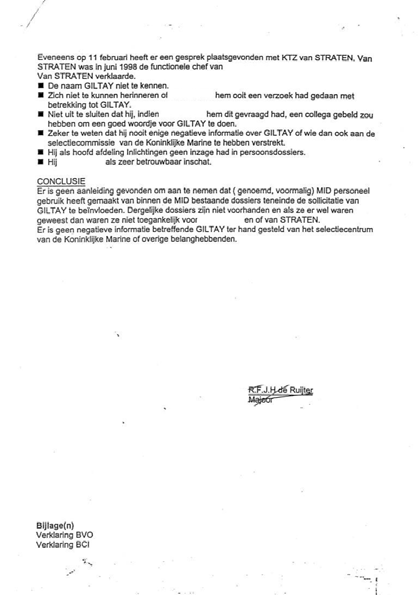

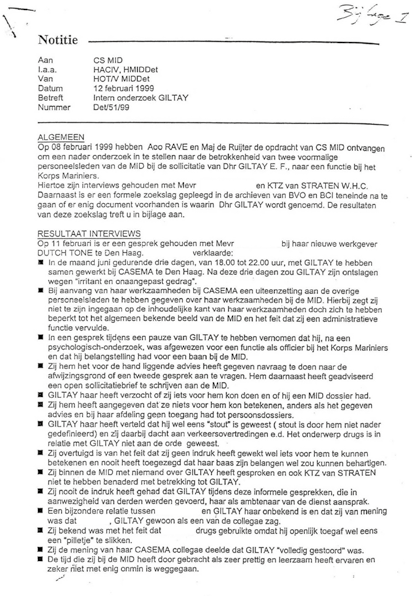
for ‘irritating and maladjusted behaviour’. And also, her having
started working there would be something that is perfectly normal
for a military intelligence officer.
On 11 February, an interview was held with
[Monica] at her new employer dutchtone
in The Hague. [Monica] stated:
■ Having worked with giltay for three
days, from 6 to 10 pm, at casema in The
Hague during the month of June. After
these three days, giltay was fired due to
‘irritating and maladjusted behaviour’.
■ At the start of her work at casema, she
made a presentation to other staff
members about her work at the mid. In
doing so, she said she did not go into the
nature of her work but confined herself
to the generally known image of the mid
and the fact that she held an administra-
tive position.
■ In a conversation during a break giltay
told her that he had been turned down
for a position as an officer in the Marine
Corps after a psychological examination
The Intel report
and that he was interested in a job in
the mid.
■ She gave him the obvious advice to in-
quire about the ground for rejection or
request a second interview. In addition,
advised him to write an open applica-
tion letter to the mid.
■ giltay asked her if she could do any-
thing for him and if he had an mid
dossier.
[continued on next page]
Chapter Seven | Escalation
57
■ She indicated to him that she could do nothing for him other than the advice given and that her department did not have access to personal files.
■ giltay told her that he had been ‘naughty’ at times (naughty was not
further defined by him) and she was thinking of traffic offences etc.
The subject of drugs was not raised in relation to giltay.
■ She is convinced that she gave no impression that she could do any-
thing for him and never promised that her boss could look after his
interests.
■ She did not discuss giltay with anyone within the mid, nor did she
approach Navy Captain van straten regarding giltay.
■ She never had the impression that during these informal conversa-
tions, which were held in the presence of third parties, giltay ad-
dressed her as an official of the service.
■ A special relationship between [jasper] and giltay was unknown to
her and that she was of the opinion that [jasper] saw giltay simply
as one of the colleagues.
■ She was familiar with the fact that [jasper] used drugs because he
openly admitted to taking the occasional ‘pill’.
■ She shared the opinion of her casema colleagues that giltay was
‘completely insane’.
■ She found the time she spent at the mid very enjoyable and instruc-
tive and certainly did not leave following any disagreement.
The mid report containing Monica’s testimony is presented to Om-
budsman Oosting by Permanent Secretary Dirk Barth on 2 March
1999. In an accompanying letter, he denies that my antecedents
have been raked up, and on behalf of Minister De Grave, he agrees
with the report’s findings: ‘A report of this investigation can be
found in appendix 1. Its results speak for themselves.’ 29
In doing so, De Grave implicitly indicates that the false state-
ment of insanity regarding me embodies his own verdict — after
all, he does not distance himself from it.
When I show the letter to Uncle Frans, he gets very upset. ‘Al-
most murderous’ is his comment. He ponders the situation, notes
that I need protection of the highest order, and lends me a state
portrait he painted of Queen Beatrix. 30 Thereby she watches over
you spiritually, he adds.
58
The Cover-Up General
I too am speechless. While Casema immediately called in the
police, I had approached the national ombudsman with restraint.
In my letter, I had shown my modesty by questioning the as-
sessment that I am too strong. Instead of providing me with a prop-
er drill as an aspiring officer, the Defence Ministry is now letting
things escalate unnecessarily.
It is not a drill sergeant trying to discipline me. No, none other
than the Permanent Secretary — the most powerful civil servant —
is attacking me as a young citizen. Thereby targeting exactly my
strong asset: namely, my bold character. The situation is akin to an
elephant trying to ward off a mosquito by trumpeting frantically.
It is quite something when a state government proceeds to cov-
er up a certain case by psychiatrifying the declarant with false tes-
timony and by dismissing a second witness — Jasper — as a drug
user. However, such kgb methods do not get you off lightly in this
country. I am sure this ploy will backfire on the senior officials who
put De Grave in charge by signing a false statement on his behalf.
The truth will come out sooner or later anyway.
Monica’s accusations are too preposterous to be taken serious-
ly. I cannot possibly become hateful about it: I have too cheerful a
character for that. No, her utterances mainly arouse wonderment
as the Ministry spreads them blindly, while the untruths are very
easy to refute.
At Telesales, Monica openly complained that she was becom-
ing ‘totally crazy’ at the mid. She may say that about herself, but
to then immediately declare others crazy as well is going way
too far. Assessing others in this way is best left to those who are
suitably qualified.
And that is exactly what happened. Two psychologists exam-
ined me in-depth at the Amsterdam Naval Barracks during the time
I worked at Casema. Their conclusions are recorded in MoD doc-
umentation, 31 in which, crazily enough, there is nothing at all to
suggest mental instability.
Nor is there any question of dismissal on the grounds of ‘irritat-
ing and inappropriate behaviour’. Temp agency consultant Sander
and former manager Anna are happy to send me a testimonial.
Chapter Seven | Escalation
59

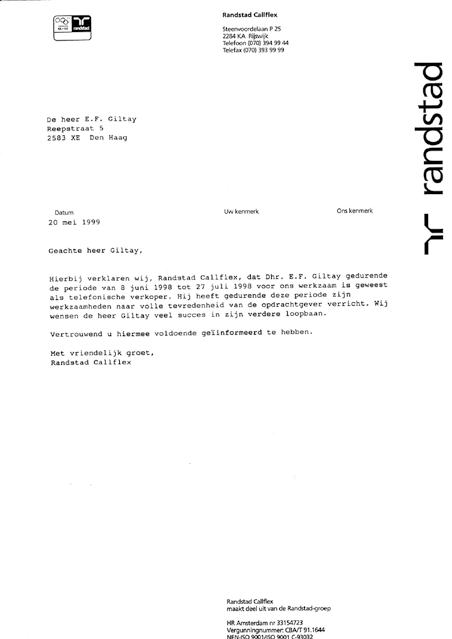

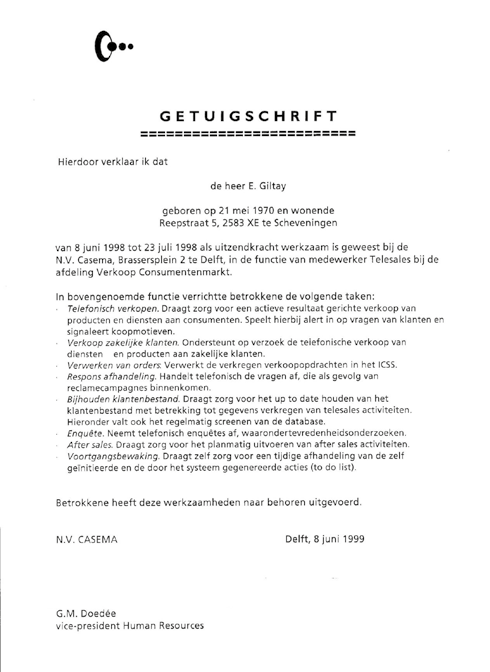
Sander declares in writing that I performed my work to the sat-
isfaction of Randstad Callflex. 32 In a second attestation, he states that I also performed my duties to the full satisfaction of client
Casema. 33 The latter is confirmed in a third testimonial signed by
Casema’s vice-president of Human Resources. 34
Testimonial Randstad
Testimonial Casema
That I was ‘fired’ is also not true. Because of my employment con-
tract with Randstad Callflex, Casema was in no position to sack
me. My departure had to do with the dissolution of the contract be-
tween Randstad and Casema, which meant that four flex workers
could no longer continue at Casema. After this, Randstad found me
a new temp job.
More importantly, Casema did not want to let go of me in con-
trast to the other Randstad workers. Before the collective contract
with Randstad was revoked, Anna invited me to become a perma-
nent employee. Following my departure, even Human Resources
president Hartogs invited me to come back to the company.
Jasper also puts his experiences at the Delft company in writ-
ing. He makes two statements about Monica’s potentially criminal
behaviour, as she spoke out about state secret files. Among other
things, he writes: 35
60
The Cover-Up General
During the time I worked at Casema, Ms [Monica] ordered me to
stop seeing Mr Edwin Giltay because she knew bad things about
him. The antecedents were so bad that according to [Monica],
Mr Edwin Giltay would not dare to tell me these.
In my communication with the Ombudsman, I had not yet pointed
out that Monica had breached state secrets regarding the mid and
Srebrenica. Nor had the spying photographer, who had scared her
so much, been discussed.
However, now that she feels it necessary to cast the character of
Jasper and yours truly in a dim light, there is no reason to keep the
heat off her. Moreover, it is beginning to dawn on me that all her
stories of lies and deceit within the mid indicate that Minister De
Grave is not being adequately briefed by this service. Does he even
know that the police had been called in following the intelligence
intrigues at Casema?
On 10 May, a letter about the spying incident goes to Ombuds-
man Oosting,36 with a request to forward it to the Defence Minister.
I inform De Grave that I will commit to getting Monica prosecut-
ed, in ‘the interest of a reliable supply of information’. A minister
should not be lied to by his own (former) intelligence officers.
September 1998, I met a legal expert in a café, whose real name
will be withheld for the sake of privacy. With him — I will call
him Lucas — I become close friends. He decides to assist me free
of charge.
Periodically, he stays with me so that we can then spend days
at a time working on legally thorough letters. We commit with
earnestness to clarifying this affair, but we also laugh a lot. As the
stupidity with which the spies operated in this affair continues to
sink in, it becomes an increasingly difficult task to take the MoD
seriously any longer.
With Lucas’ help, I write a long supplementary letter to Oosting
on 28 May 1999. 37 In it, I point out to him, among other things, that Monica was always moaning about the internal discord within the
mid. I inform him that I cannot help but feel that I have become
Chapter Seven | Escalation
61
either directly or indirectly a ‘victim’ of a battle of wills, in which I have no part.
Thereby, I refer to the Military Intelligence and Security Project
Group led by Rear Admiral S.W. van Idsinga. This flag officer was
Head of the marid before the intelligence services of the Armed
Forces (Navy, Army and Air Force) were merged into one Military
Intelligence Service in 1987. In his investigative report released in
March 1995, he wrote that ‘the impression is that there are several
tribal struggles taking place, with related suspicion’. 38 I leave Oosting in no doubt that the intrigues at Casema indicate that this trib-
al struggle is still not over.
At the National Ombudsman’s Office, case handler Peter-Paul
Schets deals with citizens’ complaints against Intelligence. In a
conversation with me, he commented that although he thought
this was a complicated case with several interesting elements, he
had little confidence in resolving it. Furthermore, he explicitly
added, complaints about intelligence agencies are hopeless from
the outset: almost all petitioners are paranoid. To that, he laugh-
ingly asked if I might also think my phone was being tapped.39
In the interest of an unbiased investigation, on 30 May I request
the National Ombudsman to replace the case handler. 40 The Dep-
uty Ombudsman, who oversees the quality of the investigations,
replies that she regrets Schets’ remarks, in as much they may have
proved insulting and offensive to me. Nevertheless, she refuses to
replace him.41
But then another unpleasant thing happens. Jasper’s stepfather,
Hartogs, is held accountable by Casema as president of Human
Resources for the confusing spying entanglements. Jasper tells me
Hartogs has been reprimanded on this intelligence affair and is to
be demoted.
Emotions of distress hit his family: Jasper talks of crying fits,
helplessness and overstrain. At a time when we see each other less
anyway, secrecy perils and fear of government machinations final-
ly lead to a complete separation between us. The mid, who ordered
Jasper to break with me, gets its way in this relationship after all.
This hits home with me, all the more so because I believe that not
62
The Cover-Up General
Casema, but the MoD should be held accountable for this military
intelligence scandal.
Since Lucas is not a licensed lawyer, on 19 May I wrote to Gerard
Spong that I need a resourceful lawyer. And certainly one that is
not afraid of the secret service. 42 On this, he decided to assist me pro bono: ‘In response to your letter, I am prepared to explore the
possibility of initiating a criminal case for defamation against the
mid officer concerned.’ 43
Following his advice, I compile a notice of complaint, which I
deliver to Chief Public Prosecutor Stef van Gend at the Palace of
Justice in The Hague on 28 June.44 In this letter, I dissect the defamatory report of the Chief of Staff of the mid and ask the Chief Pros-
ecutor to charge Monica. Furthermore, Spong telephones the MoD
to ask critical questions of its top civil servants. Taking everything
into consideration, Permanent Secretary Barth and possibly even
Minister De Grave are complicit in defamation. After all, the report
was sent out into the world on their behalf.
And then it happens: a furious Minister De Grave sacks the mid’s
top brass on 13 July 1999. Heads roll — that of the Head of the mid
General Vandeweijer and his deputy, Chief of Staff Wielinga. Dutch
national tv news programme nos Journaal opens with the news. 45
On the eight o’clock newscast, however, Minister De Grave
is not talking about this affair. No, the media is covering another
Srebrenica-related cover-up. De Grave publicly expresses his rage
that his intelligence officers misled him by withholding a report on
right-wing extremist behaviour on the part of Dutchbat soldiers.
The daily De Volkskrant reports on its front page on 14 July that De
Grave considers it essential that, as he is politically responsible
at the MoD, he has ‘all relevant information’ so that he can be ac-
countable to Parliament. De Grave: ‘That is the most basic part of
the functioning of a parliamentary democracy.’ 46
Furthermore, De Volkskrant writes: ‘The mid, which has been
undergoing re-organisation since 1987, is still not performing well.
In fact, each branch of the Armed Forces also maintains its own
intelligence service, which often does not cooperate with its parent
Chapter Seven | Escalation
63
organisation mid. The Army Intelligence Service, for example,
played an obstinate role in the aftermath of Srebrenica.’
All Dutch newspapers write about the Srebrenica report be-
ing covered up and the dismissal of the Head of the mid and its
Chief of Staff. Major De Ruyter, who interrogated Monica for the
Chief of Staff, I also encounter later in the press: it turns out he was
working as a counter-intelligence officer for the Royal Army. This
implies that, as an internal agent spying on his own colleagues,
he worked for the army’s intelligence squad, which is discredited
over Srebrenica.47
The Srebrenica photographic film was destroyed to avoid neg-
ative publicity about Dutchbat’s actions, according to radio pro-
gramme Argos. Monica highlighted the fear of publication of the
photos in Nieuwe Revu. This magazine reports on the photo roll and
De Ruyter on 17 November 1999: 48, 49
Even better known is Lieutenant Rutten’s roll of film, which
contained images of Dutchbat soldiers who helped separate
Muslim men from their wives and children during the fall of
Srebrenica in 1995. The roll was seized by the Military Intelli-
gence Service (mid) in Zagreb. Lieutenant Colonel Bleumink
and Major De Ruiter of that service called Rutten when he was
in the Netherlands and said the photos were politically sensi-
tive. Soon after, the very same De Ruiter called saying that the
negatives had accidentally turned black while being developed.
Moreover, immediately after development — and this is very
unusual — developer, bleach and fixer had been thrown togeth-
er, so an investigation into the exact cause of the failure was no
longer possible.
On 21 July, a week after the dismissal of the mid command, with
Lucas’ help I write a supplementary notice of complaint to Chief
Public Prosecutor Van Gend.50 In twelve pages, I elaborate on Mon-
ica’s defamatory testimony and her laments — witnessed, among
others, by Defence woman Ina — about the mid. I include the state-
ments issued by Randstad, Casema and Jasper.
64
The Cover-Up General
Van Gend replies on August 26 that Monica’s remarks do not fall
within any offence mentioned in the Dutch Criminal Code. Fur-
thermore, he writes nothing about Ina. 51 This is highly remarkable.
After all, this sends the message that it is okay for agents during
infiltrations to reveal their identities for no reason, to complain
about assignments in faraway countries, and to discuss conflicts
within their organisation regarding war crime footage.
A copy of my wide-ranging notice of complaint I hand over to
the National Ombudsman’s Office as the documents contradicting
Monica are relevant to his investigation into the mid.52 However,
Oosting’s successor as National Ombudsman, Roel Fernhout, com-
pletely ignores this letter.
On 17 December 1999, Fernhout finally issues the long-awaited Om-
budsman’s report. It deems my complaints of 1 December the pre-
vious year to be unfounded. 53
Needless to say, it is an absolute mortal sin for intelligence of-
ficers to speak to third parties about their work. Anyone with any
common sense knows that secret agents are supposed to operate in
secret — in other words, undercover — during infiltrations. But like
Van Gend, Fernhout does not criticise this misstep.
Besides the notice of complaint to Van Gend, case handler
Schets turns out to have ignored other documents, such as my let-
ter of 10 May about the espionage break-in. Consequently, there is
no mention of this at all in the ombudsman’s report, nor about the
withholding of the photo roll or other misconduct of the mid.
On the other hand, he does include that I am ‘irritating’, ‘malad-
justed’ and ‘completely insane’, as part of the ‘Minister’s Position’.
It is beyond belief but the National Ombudsman publishes it. He
thereby ignores the Defence psychologists’ test results and echoes
the gross allegations that De Grave presented.
I had informed the ombudsman that my former colleagues
— Ina, Jasper, Angela, Marlies, Mark and Irene — were witnesses
to the espionage entanglements in our workplace. Ina even took
notes. But no, none of them were heard.
The government intrigues at Casema caused a lot of turmoil
Chapter Seven | Escalation
65
and even had personnel consequences at the top of this large com-
pany. Did the National Ombudsman contact its management? No,
he limits his investigation to just two aspects of my naval applica-
tion. While thereby showing his supreme discretion when it comes
to intelligence wrangling, he shows little discretion where other
matters are concerned, such as my escort past.
To report the defamation by Monica, I visited the police station
twice in July 1999. Both times I was rebuffed. By necessity, I sent
two letters of complaint about this to The Hague Police Chief Jan
Wiarda. 54 Long procedures followed in which I had to write many
letters, only because I wanted to exercise my right to file a police
report. My resolve in this sensitive matter is apparently deemed
unwelcome, which is evidenced by an anonymous late-night phone
call in which I am scolded for being a ‘bloodhound’ and a ‘leech’. 55
It is only on 12 June 2000 that I am finally given the opportunity
to have an official record taken.56 The police forward this report
with twelve supplements to the Public Prosecutor’s Office in The
Hague for investigation.57
Months later, on 19 September, I receive a letter from Inspector
A. Teiwes of the police in The Hague on this matter. 58 Without ex-
planation, he writes that the investigation did not yield any result
and the report will be filed in the police records.
It is strange that this letter comes from the police. After all, the
Public Prosecutor’s Office should not send a police report back to
the police after investigation. Moreover, the police force is the au-
thoritative branch against which I have lingering proceedings be-
cause it had refused to record my report. By deciding to put it in its
own archives, the police are passing judgement in a case in which
they themselves are parties. This violates the constitutional separa-
tion of the judiciary and the executive.
The turn of events makes me decide to call on the Queen. On
14 October 2000, I write to Her Majesty Queen Beatrix — who as
Head of State is of course above all parties — about this scandal, the
police obstruction and the violation of the separation of powers.59
In order to refute the false statements of the MoD, I attach
66
The Cover-Up General

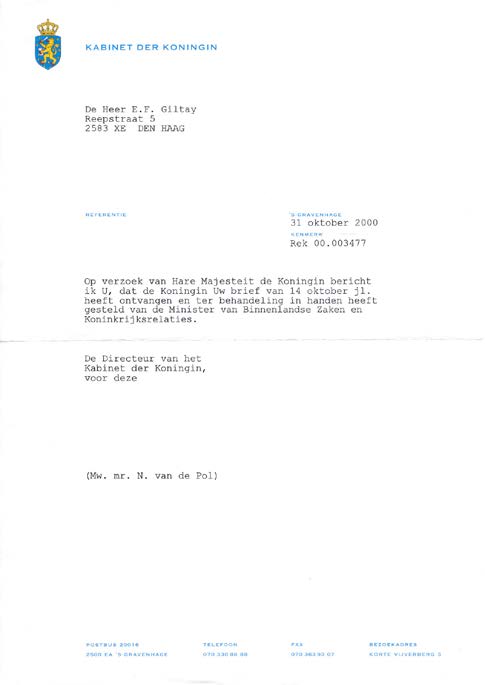
several testimonials to my letter. In a 1994 recommendation, the
director of International Operations at ibm praised the excellent
way I performed my job as a technical writer at the Amsterdam
headquarters.60 A testimonial from April 2000 from the London of-
fice of Deloitte & Touche is also full of praise: ‘Edwin has fitted in
very well in a team comprising fourteen different nationalities and
his friendly, polite and professional manner has won him many
friends.’ 61
Apart from the queen, I turned to the Minister of Defence with
a request for rehabilitation. 62 However, this is rejected vehement-
ly by his Permanent Secretary on 30 October 2000. 63 The Ministry
refuses to distance itself from the misleading report of the Chief
of Staff of the mid who was dismissed for providing misleading in-
formation, and points to the National Ombudsman’s investigation
which in no way examined the military intelligence intrigues at
Casema.64 The Permanent Secretary informs me: ‘No further letters
on your part will be responded to.’ 65
Then in a letter a day later — to my
delight — the tone is diametrically dif-
ferent. The Queen’s Office replies on 31
October: 66 ‘At the request of Her Majesty
the Queen, I inform you that the Queen
has received your letter of 14 October
last and has placed it for consideration
in the hands of the Home Secretary.’
This entails that the Head of State inter-
venes and follows this case.
With Queen Beatrix’s commitment,
I win my procedures against the po-
lice. After the Independent Police
Royal intervention
Complaints Commission of The Hague
issues critical advice, 67 Mayor Wim
Deetman of The Hague admits to be-
ing wrong. The complaints I had filed
about the obstruction of my filing of
a police report are upheld in its main
Chapter Seven | Escalation
67
points on 14 December. 68 The mayor also orders his judgement to be brought to the attention of the police. The point is to ‘learn
lessons’. 69
Finally, Home Secretary Klaas de Vries informs Her Majesty
Queen Beatrix and yours truly by letter of these outcomes. 70
68
The Cover-Up General

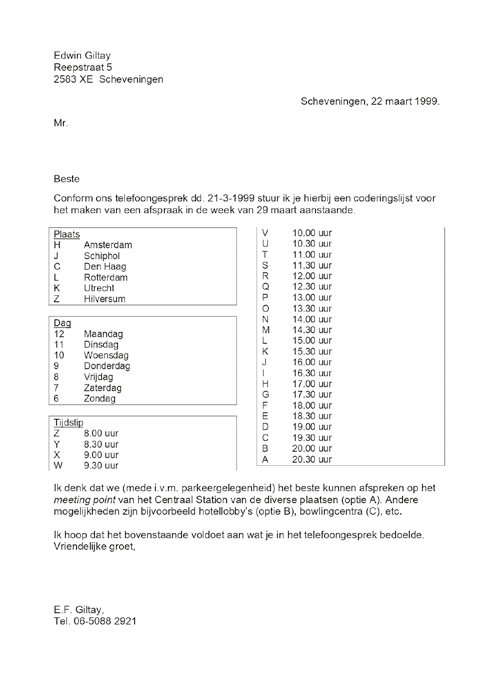
CHAPTER EIGHT |
CHAPTER 8
Reports
The legal experts assisting me in disentangling this intelli-
gence affair each have their own network, which includes
a top official in the Domestic Security Service. So, in 1999,
2000 and 2001, Lucas keeps me informed of the latest develop-
ments in the case.
In return, I provide the bvd chief in question with my account
of exactly what had happened at Telesales. At the same time, I
serve as a sounding board for the reconstruction the bvd is making
of this affair.
My cooperation with the bvd chief
begins a year after the Casema break-
in; prior to this incident, I did not know
who he was. The bvd official insists on
not being named. His job title is not to
be made public either. He also believes
that given his position and status, it is
preferable not being seen together. A
more convincing argument is that he
can protect me better if our contact re-
mains secret. So our communication
goes through Lucas.
I see him regularly. We also talk
Code list
a lot on the phone, although we use
code: Minister De Grave is dubbed my
grandfather, we refer to The Hague as
Amsterdam, and when it’s noon we
mean eight o’clock in the morning. We
exchange code lists by post to keep the
Chapter Eight | Reports
69
meanings of names, places, and numbers secret. We also change
the code from time to time so that no one can make sense of our
phone calls and we keep our meetings as secret as possible.
Lucas passes on information in our talks, but in one instance —
on 14 December 1999 — I receive a diskette containing a document
that accurately describes some of the key points of the affair. It was
drawn up at his home in collaboration with the top official. The fact
that the latter did not use his work computer and that it is not an
official document, suggests to me that this is a case of not playing
by the book.
The bvd official recommends using the text in a letter to the
Minister of Defence. However, as it is explicitly stated that such a
move is entirely at my own risk, I refrain from doing so. I regret
that the bvd will not openly support me.
All intelligence is provided by Lucas in a personal capacity —
there are no formal links with the bvd. However, the data provided
offers insight into the shadowy world of intelligence and the in-
ternal struggles that take place within. This makes the bizarre spy
plots more comprehensible, which is a relief to me — I finally un-
derstand what is going on.
It becomes apparent that Ina’s ambition was to return to work
now that her daughters had grown. She then went to work as an
undercover agent for her husband at the MoD, who sent her to the
Telesales department to observe Monica.
In military hierarchy, this situation is most peculiar: a husband
being his own wife’s superior officer. A chain of command of this
nature is not even allowed. After all, it reeks of nepotism, a form of
corruption in which family members do each other favours.
Ina’s infiltration at Casema was her very first mission as an in-
telligence officer. Before being thrown into the deep end, she had
only undergone a short spy training course where she already
made some embarrassing mistakes. During her training, for in-
stance, she revealed her identity — a mistake no undercover agent
should make.
According to the bvd, Ina’s notes were later edited by an experi-
enced analyst into a ten-page official report, which was handed to
70
The Cover-Up General
a number of senior members of the Armed Forces and secret ser-
vices. It was accompanied by photographs of Monica, myself and
other Casema staff taken during the break-in.
I do not receive the report with the photos. This is because each
copy has a secret and unique feature that would make it traceable
to the recipient. In order not to cause any severe embarrassment to
the bvd’s top official, Lucas only explains the contents verbally in
interviews lasting several hours.
The way Lucas got hold of the report was unusual. The top of-
ficial had invited him to his office, but on entering he announced
that he would be unavailable for the next 75 minutes and gave his
exact time of return. He advised Lucas to stay in his room and read
the Spike and Suzy comic book that was lying there.
When the top official returned, Lucas thanked him for suggest-
ing he read the comic. With a wink, he said he found it very inter-
esting and enlightening. The fact that Ina’s intelligence report had
been hidden between the pages, was not remarked upon.
With professional pride, Lucas explains that he pretended to be
engrossed in the comic book while secretly reading the report, al-
lowing the chief to deny having leaked it. That’s how it works in this
business, so it appears.
After having been briefed extensively on Ina’s observation re-
port, I can but conclude that Ina has kept many of her mistakes to
herself. She described the events subjectively.
Lucas tells me that in her report, Ina kept asking herself how
it was possible that I knew so much more about her. It is not a
difficult question to answer: there had been too many slips of the
tongue on her behalf, which could hardly be missed.
When Ina spoke of ‘my Ad’, she seemed unaware that she was
revealing her husband’s first name. In her report, Ina would elab-
orate on the difficulty she had in answering Monica’s questions
about her first love. According to Lucas she complained about
Monica’s impertinence, but she didn’t mention her giving revealing
answers obediently.
When Ina answered the phone with the name Van Baal, she was
very apologetic. This time she was very aware that she had slipped
Chapter Eight | Reports
71
up. ‘Oh, how silly of me,’ she remarked. But there would be no trace
of this lapse in her report.
According to Lucas, the fact I caught Ina making observational
notes, which she then hid — turning red with embarrassment — was
not recorded either. That was probably just too painful. Of course,
as an agent, it is an unprecedented blunder to allow others to look
at your papers, so why report it?
Ina’s behaviour stood out. Her colleagues and managers at
Casema distrusted her. She was ‘burned’, the intelligence term for
being suspected of being a secret agent during an operation. In-
stead of reporting this mistrust, Ina chose to criticise strongly the
attitude of her Telesales colleagues.
‘A cheeky monkey from a low social background’ is how Ina
characterised me. The Domestic Security Service also says that
she described me as a ‘sports freak’. This observation is — lo and
behold — true. Compliments are in order for the astuteness of this
spy, who managed to alert our top generals to my trained physique,
in the nick.
Ina kept a detailed record of all of Monica’s breaches of state
secrets, Lucas reveals. Monica, who almost begged to be heard at
Casema, unwittingly managed to have her cries and lamentations
about the mid and Srebrenica recorded in minute detail.
But apparently Ina never found out why Monica was sent to
work in Telesales. She appears to have been kept in the dark delib-
erately by the intelligence community. In fact, in this business it
is common for infiltrators to be denied information by their supe-
riors — so they can observe with an open mind. It is questionable,
however, whether this always yields valuable information. Lucas
reports that Ina, in her discourse, wondered in vain what Moni-
ca and I were talking about in the pantry during our penetrating
conversations.
Ina was also unaware that I started a relationship with Jasper.
But she did notice that I never talked about having a girlfriend. In
her report to the chiefs of Defence and intelligence, she includ-
ed this trivial observation with the question whether I was gay or
straight, Lucas said.
72
The Cover-Up General
In her account, Ina was not certain about Jasper’s sexual orien-
tation, in contrast to Monica’s. Without nuance, she was classified
as a lesbian.
It is precisely this meddling in private affairs by the MoD that
infuriated the aforementioned senior bvd official.
Lucas points out that Ina was suspicious of Jasper’s work in
Telesales as he was the stepson of the Head of hr: was Mr Hartogs
perhaps using him to keep an eye on his employees? The bvd is in
the dark about the latter and wants to know what I think.
In my opinion, the suspicions about Jasper and his stepfather
are misplaced. Hartogs was hardly aware of the intrigues in our
small department. It is inconceivable that he trained Jasper to be
a sniffer dog and then deliberately placed him in a department
where two women from the MoD were to be employed later. On top
of that, Jasper is a self-possessed man who won’t be told what to do.
Lucas reveals that Ina got hold of the personal files of all the
Telesales staff and used those against us. However, I was told that
she had made an exception for herself.
Incidentally, the antecedents requested would hardly be rele-
vant to this affair, and Lucas is keeping this privacy-sensitive in-
formation to himself. It is only vaguely suggested that there is a
connection between the irt affair and a former Casema colleague,
whose name Lucas withholds for security reasons at the insistence
of the bvd chief. Indeed, what this person had to endure was a very
serious matter.
The irt affair is a Dutch mega-scandal in which the police, the
judiciary and the military police collaborated with hardcore crim-
inals to let through drugs in order to bust major gangs. In the pro-
cess, undercover agents were tempted by large sums of money. The
fact that this had led to serious derailments was not just something
I had read in the newspapers — Jasper had also told me about it.
After all, our colleague Julia had told him about the dangerous sit-
uation she had found herself in. Lucas explains that it was pure
coincidence that the person in question worked at Casema. Never-
theless, it was a coincidence that sparked the mid’s interest in our
department.
Chapter Eight | Reports
73
Also, Lucas confirms the suspicion that Ina conspired with the
burglar at Casema. When I was absent on 7 July 1998, the personnel
pass of our supervisor was stolen by Ina. Allegedly, she reported
having stolen the access card for the photographer, who needed it
to enter the premises.
A week later, Ina refused to join us for coffee in the pantry dur-
ing our break. There was a reason for this, as we can now see: she
needed to stay out of sight of the photographer who was about to
invade our workspace. So at 8:08 pm that day, only Monica’s infil-
tration was recorded for posterity. According to Lucas, the burglar
was equipped with a special camera that also took infrared photo-
graphs. He used it to take pictures of Monica and me in the pantry
during her attempt to recruit me as an analyst.
Using the stolen pass, he left the premises and joined his ac-
complice in their car.
Later that evening, around 9:30 pm, I overheard Ina having a
private conversation over the phone. Nervously, she reported that
everything was going well and that the video-recorder could be
switched on. The word ‘video-recorder’ turned out to be a code
here: upon hearing this, the photographer knew that the way was
clear for him to break in for the second time that night.
After ‘switching on the video-recorder’, Ina left for the toilet.
This time the photographer walked past Telesales and across the
floor of the Internet Helpdesk with his camera using his flashlight.
Lucas comments that the latter had been a misunderstanding; the
Internet Helpdesk did not need to be in the picture.
The mistake prompted a brave helpdesk employee to chase the
intruder. Nathan had also noticed that the stranger was signalling
to Ina. Apparently, she had not stayed in the toilet long enough to
avoid the burglar.
From a legal point of view, Ina is not an accomplice to bur-
glary, but to sneaking in — because in this case there had been
no burglary damage. In addition, she could also be prosecuted
for the theft of the access card. (It’s only since 2002 that intelli-
gence officers are allowed by law to commit crimes in exceptional
circumstances.)
74
The Cover-Up General
The police were called and Ina was immediately suspected
of involvement in industrial espionage. This frightened her, as
did my questions about her military spouse. I saw her tremble
several times.
In her report, she later described how she tried to keep me at
a distance by sitting at another desk island. But our department
was too small to hide. Lucas reveals that the MoD then decided to
sabotage my temporary position: pressure was put on Casema, at
the highest level, to let me go. Next, the company terminated the
contract with Randstad without notifying the employment agency
of the reason for the termination.
Consultant Sander was downright furious. He raised the possi-
bility of filing a lawsuit against Casema and informed Randstad’s
head office about the strange way in which the contract had been
terminated. Supervisor Marlies was overwhelmed and could not
make sense of my departure. She had tears in her eyes and assured
me that Casema had been very happy with me. Ina, on the other
hand, did not seem surprised. She said out loud on the work floor
that I had been fired.
Lucas confirms that Ina stayed with her aunt during the week
for her temporary job. He also mentions the quay close to the Pal-
ace Gardens in The Hague, but adds that she only stayed there for a
short time. Next, a place to sleep was arranged for her in the Fred-
erick Barracks, where she also worked on her notes.
If one is an undercover agent living near Alkmaar and working
in Delft, staying at a military base in The Hague is convenient as it
saves a lot of travelling time. However, it does come at a risk: you
will be in the spotlight of the other agents being there.
Lucas says that Monica almost bumped into Ina in a mess hall
there at the time: Ina was having lunch, when Monica sudden-
ly came in. Ina was scared to death. This incident between two
Casema colleagues, who were also secretly each other’s intelli-
gence colleagues, ended well for Ina only just.
Ina went on to describe other lapses in her report: Monica rec-
ognised the intruding photographer as he walked around Case-
ma’s premises. This was a bvd employee called Jan. Monica — who
Chapter Eight | Reports
75
travelled a lot for the mid and had many contacts — is said to have
met him before.
Only now do I understand why Monica was so shocked when
Jan took our photograph: it probably dawned on her that an intelli-
gence trick was being played on her.
Lucas goes on to report on this operation: after the break-in,
Monica came under fire in a confrontation at the MoD, where all
the breaches of state secrets that had been registered by Ina were
used against her. At the same time, Jan’s photos were used as lev-
erage. Whether Monica’s Marine Colonel — whose name is never
revealed — was allowed to order her infiltration is highly debatable.
During her interrogation, no mention was made of the fact that
it was Ina who had been secretly watching her. According to Lu-
cas, Ina reported in her findings that Monica only distrusted her
for a short time. After I had revealed that Ina’s husband worked
for the MoD, she would indeed have been able to regain Monica’s
trust again.
Not knowing that it was Ina who had betrayed her to the MoD,
Monica, being suspicious, began to distrust others in Telesales. She
tried to keep various colleagues at bay and even ordered Jasper not
to get in touch with me again. This was while he and I were lovers,
but she wasn’t aware of that. Jasper did not want to draw attention
to himself at work because of his affair with a former colleague and
had only mentioned that he was still seeing me.
Monica was also suspicious of Jasper. She reproached him for
not telling her earlier that he was the stepson of the most senior hr
officer. That bothered Jasper quite a bit, especially as Monica did
not make it clear to him why that troubled her so much.
Our new colleague Mark was also distrusted. On one of his first
evenings at Casema, he took Irene, a single Hindustani colleague,
home in his car after work. His charm had not failed to impress her.
The next evening, the warm-blooded woman told her colleagues
that she had fallen in love with Mark. Irene spoke very highly of
him: in addition to his work at Casema, he supposedly also worked
at the Ministry of Foreign Affairs. She had known him for some
76
The Cover-Up General
time from a Surinamese party and said she was now having an af-
fair with this married man.
In Irene’s opinion, it was better to confess the romance herself,
in order to avoid gossip in the department. She had also told Anna
face-to-face. Anna was not happy about the affair at work, Irene
said, but she accepted it and appreciated her honesty.
Why did this Foreign Office employee join our department?
Monica wasn’t the only one who wondered. Lucas explains that
after Ina found out about Mark’s government job through her in-
telligence contacts, she suspected him in her report of being a fel-
low agent. However, she would have remained in the dark about
his motives.
When I asked Mark about his work at Foreign Affairs, he was
shocked. In a voice that betrayed a certain amount of fear, he want-
ed to know how I had found out about that. After I explained that
Irene had divulged it, he confirmed that he worked there, but asked
me to keep it a secret. After all, he ‘didn’t want to draw unnecessary
attention to himself because of this job’. I didn’t understand. Work-
ing at this prestigious ministry is not something to be ashamed of.
When we bumped into each other again after the break-in, I
asked him once more about his work at the Foreign Office. He re-
plied that he had been given time off during the summer holidays
so he could work at Casema during the day through temp agency
Teleprofs. This way, he took the opportunity to find out more about
the intrusion.
That Mark was an agent is something the bvd’s top official de-
nied strenuously. Nevertheless, the combination of employers
remains questionable. It is conceivable that a curious bvd chief
might have wondered what those two Defence women were up to
at Casema. To find out, he could have had another government em-
ployee infiltrate our department. Keeping such an operation secret
was only a matter of deploying someone nobody in the intelligence
community would recognise as an agent.
According to this hypothesis, the fact that Mark got burned so
quickly can be explained by his failing to keep his professional and
personal lives separate as he seduced a female beauty during his
Chapter Eight | Reports
77
first week — like a real-life James Bond. For some time, Irene had
known him. In admiration of her new lover, she revealed his back-
ground at the Ministry, after which everyone was talking about it.
That Mark worked in the Foreign Office had not escaped
Jasper’s attention. Monica and my boyfriend had been talking
about it before they fell out. Jasper found the Foreign Office job re-
markable, but did not believe Mark was an agent — that seemed too
far-fetched. Monica, however, would be less convinced of Mark’s
innocence. After I told Monica that Ina’s husband worked for the
MoD, Ina reportedly tried to divert Monica’s attention away from
her husband. I learn from the bvd that Ina revealed to Monica that
Mark worked at the Foreign Office in order to make him a suspect.
No one trusts anyone anymore, Monica moaned about her se-
cret service work. Could this paranoia be so intense that Mark, at
the behest of the bvd, infiltrated Casema in order to keep an eye on
Monica and Ina’s Defence operations?
The bvd top official may deny that Mark was a secret agent. But
that does not make it any less suspicious that Mark, as a civil serv-
ant, took up a flexitime position in the business world during gov-
ernment office hours, asking questions to get to the bottom of an
espionage case that was compromising fellow civil servants work-
ing at the mid.
It is also worth mentioning that Mark was annoyed at not being
able to keep his Foreign Office background a secret. He was afraid
of drawing attention to himself because of this job, he confessed
to me. But why? If he was just a casual witness to Monica and Ina’s
misbehaviour, why was he acting so cautiously? Was his role as a
witness perhaps a set-up?
Taking it all in, I realise that Monica, Ina and Mark worked
at Casema through the Teleprofs employment agency. I learn
from Lucas that one of the consultants at the Teleprofs branch at
Noordeinde, The Hague, was incidentally and covertly performing
services for the Dutch intelligence services. According to Lucas,
this consultant helped agents to infiltrate Casema.
Teleprofs did not pay its temps an evening allowance or travel
expenses. Despite their government pay checks, Monica, Ina and
78
The Cover-Up General
Mark were willing to be underpaid temps. Almost like love-birds,
they perched next to each other in the small Telesales department.
This way, the Teleprofs temps — some of whom were also on civil
servant salaries — forced their Randstad colleagues out of business.
While infiltrating, agents should try to operate as quietly as
possible. Their behaviour should not in any way be conspicuous
or influence the events they are observing. Since the three failed
miserably at this, the obvious course of action would have been
to withdraw them quietly. Nevertheless, the decision was made to
sideline yours truly, an unwelcome witness.
A few months after mid Chief of Staff Wielinga issued his mislead-
ing report on Monica’s interrogation, the Minister of Defence dis-
missed him for deception. Having taken note of the content of Ina’s
findings, I realise that this report also misleads the MoD. Ergo: both
reports are subjective. Monica and Ina both justify themselves with
lies and denounce others. For example, Monica is mostly criticised
by Ina, which I firmly believe does not do justice to Monica’s noble
opposition to the culture of cover-ups in the mid and the withhold-
ing of the Srebrenica photo roll from the Minister.
Now that the bvd has approached me to help clarify this affair, I
decide to prepare an impartial and nuanced counter-report. Wasn’t
I asked to assess the security situation on the ground for deployed
Armed Forces personnel?
In my observation report, I focus first on Ina and Monica, and
later on Mark. For the period after my departure, I rely on informa-
tion that was passed on to me secretly by Jasper. He showed little
interest in Mark and Ina. But he talked a lot to Monica. This pro-
vides valuable intelligence about her position in the military secret
service, as well as the photo prints that turn out to have been de-
veloped after all.
Chapter Eight | Reports
79
CHAPTER NINE |
CHAPTER 9
Reconstruction
The information I receive is not limited to the intelligence
operations carried out at Casema. In 1999, 2000 and 2001,
government officials also brief me on other aspects of this
military scandal. This will help to answer questions such as: how
did a company in Delft become the battleground of an internal
conflict within the Dutch espionage sector? And why am I getting
involved in this?
With the intelligence gathered, this intricate affair can be un-




























































